Tourism is one of the world’s fastest-growing industries and a major foreign exchange and employment generation for many countries. It is one of the most remarkable economic and social phenomena.
The word ‘tour’ is derived from the Latin word tornus, meaning ‘a tool for making a circle.’ Tourism may be defined as the movement of people from their usual place of residence to another place ( with the intention to return) for a minimum period of twenty-four hours to a maximum of six months for the sole purpose of leisure and pleasure.
According to WTO (1993), ” Tourism encompasses the activities of persons traveling and staying in places outside their usual environment for not more than one consecutive year for leisure, business, and other purposes.”
The Rome conference on tourism in 1963 defined tourism as ‘ a visit to a country other than one’s own or where one usually resides and works. This definition, however, did not take into account domestic tourism, which has become a vital money-spinner and job generator for the hospitality industry.
The UNWTO defines tourists as ‘ people who travel to and stay in place outside their usual environment for not more than one consecutive year for leisure, business and other purposes not related to the exercise of an activity remunerated from within the place visited.
According to the Tourism Society of Britain ,” tourism is the temporary short-period movement of people to destination outside the places where they usually live, work; and activities during their stay at these destinations.” This definition includes the movement of people for all purposes.
The development of technology and transportation infrastructure, such as jumbos jets, low-cost airlines, and more accessible airports, have made tourism affordable and convenient. There have been changes in lifestyle – for example, now retiree-age people sustain tourism around the year. The sale of tourism products on the internet, besides the aggressive marketing of the tour operators and travel agencies , has also contributed to the growth of tourism.
27 September is celebrated as world tourism every year. This date was chosen as on that day in 1970, the Statutes of UNWTO were adopted. The purpose of this day is to raise awareness of the role of tourism within the international community.

History of Travel and Tourism
Travel is as old as mankind on earth. At the beginning of his existence, man roamed about the planet’s surface in search of food, shelter, security, and better habitat. However, with time, such movements were transformed into wanderlust.
About five thousand years ago, climate changes, dwindling food and shelter conditions hostile invaders made the people leave their homes to seek refuge elsewhere like the Aryans left their homes in Central Asia due to climate changes. Perhaps, this leads to the development of commerce, trade, and industry.
Religion, education, and cultural movement began during the Hindu and Chinese civilizations. Christian missionaries, Buddhist monks, and others traveled far and wide carrying religious messages and returned with fantastic images and opinions about alien people.
For centuries movement of people continued to grow due to the efficiency of transport and the assistance and safety with which the people could travel. By the end of the 15th century, Italy had become Europe’s intellectual and cultural center. It represented the classical heritage both for the intelligentsia and the aristocracy.
During the 16th century, travel came to be considered an essential part of the education of every young Englishman. Travel thus became a means of self-development and education in its broadest sense. The educational travel was known as the ‘ Grand Tour .’
The industrial revolution brought about significant changes in the pattern and structure of British society. Thus, the economy of Britain was greatly responsible for the beginning of modern tourism. It also created a large and prosperous middle class. Because of remarkable improvement in transportation systems in the latter half of the 18th century and the first quarter of the 19th century, an increasing number of people began to travel for pleasure.
Travel was inspired initially by the need for survival (food, shelter, and security), the desire to expand trade, and the quest to conquer. As the transportation system improved, the curiosity for transforming the vast and virgin world into a close neighborhood created a new industry, i.e., Travel and Tourism .
However, the developments of rails, roads, steamships, automobiles, and airplanes helped to spread technology across the globe. Earlier travel was a privilege only for wealthy people, but with the industrial revolution, the scenario altogether changed. Transportation, as well as accommodation, became affordable to middle and working-class citizens.
Essentially, with the development of jet travel, communication, new technology, tourism, and travel became the world’s largest and fastest-growing industry.
Travel and tourism have recently emerged as a dominant economic force on the global scene, accounting for more than 12% of total world trade and growing at 8 percent annually.
Types of Tourism
Tourism has two types and many forms based on the purpose of visit and alternative forms of tourism. Tourism can be categorized as international and domestic tourism .
Tourism has two types and various forms. Based on the movement of people, tourism is categorized into two kinds. These are the following:
International Tourism
When people visit a foreign country, it is referred to as International Tourism . To travel to a foreign country, one needs a valid passport, visa, health documents, foreign exchange, etc.
International tourism is divided into two types; Inbound Tourism & Outbound Tourism.
Inbound Tourism
This refers to tourists of outside origin entering a particular country. Traveling outside their host/native country to another country is called inbound tourism for the country where they are traveling. For example, when a tourist of Indian origin travels to Japan, it is Inbound tourism for Japan because foreign tourists come to Japan.
Outbound Tourism
This refers to tourists traveling from the country of their origin to another country. When tourists travel to a foreign region, it is outbound tourism for their own country because they are going outside their country. For example, when a tourist from India travels to Japan, it is outbound tourism for India and Inbound tourism for Japan.
Domestic Tourism
The tourism activity of the people within their own country is known as domestic tourism . Traveling within the same country is easier because it does not require formal travel documents and tedious formalities like compulsory health checks and foreign exchange. A traveler generally does not face many language problems or currency exchange issues in domestic tourism.
Forms of Tourism
Tourism has various forms based on the purpose of the visit and alternative forms. These are further divided into many types according to their nature. Forms of tourism are the following:
Some most basic forms of tourism are the following:
- Adventure Tourism
- Atomic Tourism
- Bicycle Tours
- Beach Tourism
- Cultural Tourism
- Industrial Tourism
- Medical Tourism
- Religious Tourism
- Rural Tourism
- Sex Tourism
- Space Tourism
- Sports Tourism
- Sustainable Tourism
- Virtual Tourism
- War Tourism
- Wildlife Tourism
Classification of Tourism
Tourism can be classified into six distinct categories according to the purpose of travel. These are the following:
1) Recreational : Recreational or leisure tourism takes a person away from the humdrum of everyday life. In this case, people spend their leisure time in the hills, sea beaches, etc.
2) Cultural tourism satisfies cultural and intellectual curiosity and involves visits to ancient monuments, places of historical or religious importance, etc.
3) Sports/Adventure : Trips taken by people with a view to playing golf, skiing and hiking, fall within this category.
4) Health : Under this category, people travel for medical, treatment or visit places where there are curative possibilities, for example, hot springs, spa yoga, etc.
5) Convention Tourism : It is becoming an increasingly important component of travel. People travel within a country or overseas to attend conventions relating to their business, profession, or interest.
6) Incentive Tourism : Holiday trips are offered as incentives by major companies to dealers and salesmen who achieve high targets in sales. This is a new and expanding phenomenon in tourism, These are in lieu of cash incentives or gifts, Today incentive tourism is a 3 billion dollar business in the USA alone.
Nature of Tourism
Tourism as a socio-economic phenomenon comprises the activities and experiences of tourists and visitors away from their home environment and are serviced by the travel and tourism industry and host destination. The sum total of this activity experience and services can be seen as a tourism product.
The tourism system can be described in terms of supply and demand. Tourism planning should strive for a balance between demands and supply. This requires an understanding not only of market characteristics and trends but also of the planning process to meet the market needs.
Often tourists from core generating markets are identified as the demand side; the supply side includes all facilities, programs, attractions, and land uses designed and managed for the visitors. These supply-side factors may be under the control of private enterprises, non-profit organizations, and the government. New and innovative forms of partnerships are also evolving to ensure the sustainable development and management of tourism-related resources.
The supply and demand side can be seen to be linked by flows of resources such as capital, labor, goods, and tourist expenditures into the destination, and flows of marketing, promotion, tourist artifacts, and experiences from the destination back into the tourist generating region.
In addition, some tourist expenditures may leak back into the visitors generating areas through repatriation of profits of foreign tourism investors and payment for improved goods and services provided to tourists at the destination. Transportation provides an important linkage both to and from the destination.
For planning purposes, the major components that comprise the supply side are:
- Various modes of transportation and other tourism-related infrastructure.
- Tourist information.
- Marketing and promotion.
- The community of communities within the visitor’s destination area.
- The political and institutional frameworks for enabling tourism.
The tourism system is both dynamic and complex due to many factors linked to it and because of the existence of many sectors contributing to its success. These factors and sectors are linked to the provision of the tourist experience and the generation of tourism revenue and markets.
The dynamic nature of the tourism system makes it imperative to scan the external and internal environment of the destinations on a regular basis so as to make changes when necessary to ensure a healthy and viable tourism industry.
Thus, it is now an accepted fact that tourism development can no longer work in isolation of the environment and the local communities, nor can it ignore the social and cultural consequences of tourism.
Importance of Tourism
Tourism and hospitality , which are inextricably linked to each other, are among the major revenue-earning enterprises in the world. They happen to be among the top employers too. There has been an upmarket trend in tourism over the last few decades as travel has become quite common. People travel for business, vacation, pleasure, adventure, or even medical treatments.
Tourism constitutes an important industry today. It has opened up new vistas for the play of economic emancipation. It provides a very potent contribution by strengthening and developing the financial resources of a country. Moreover, it is a process in which mutual material and mental benefits occur. Furthermore,
- Tourism fetches foreign exchange in the form of invisible exports, which results in the manifold progress of the nation.
- Tourism generates jobs. These employments are the main contribution of tourism to generating national income. But one should remember that employment in the tourism industry is often seasonal.
- Tourism often leads to the commercialization of art forms and especially handicrafts. Art items with cultural or religious meaning are sought by tourists as souvenirs. As more and more tourists visit a destination, souvenir production has increased, often leading to mass production. This production also generates income.
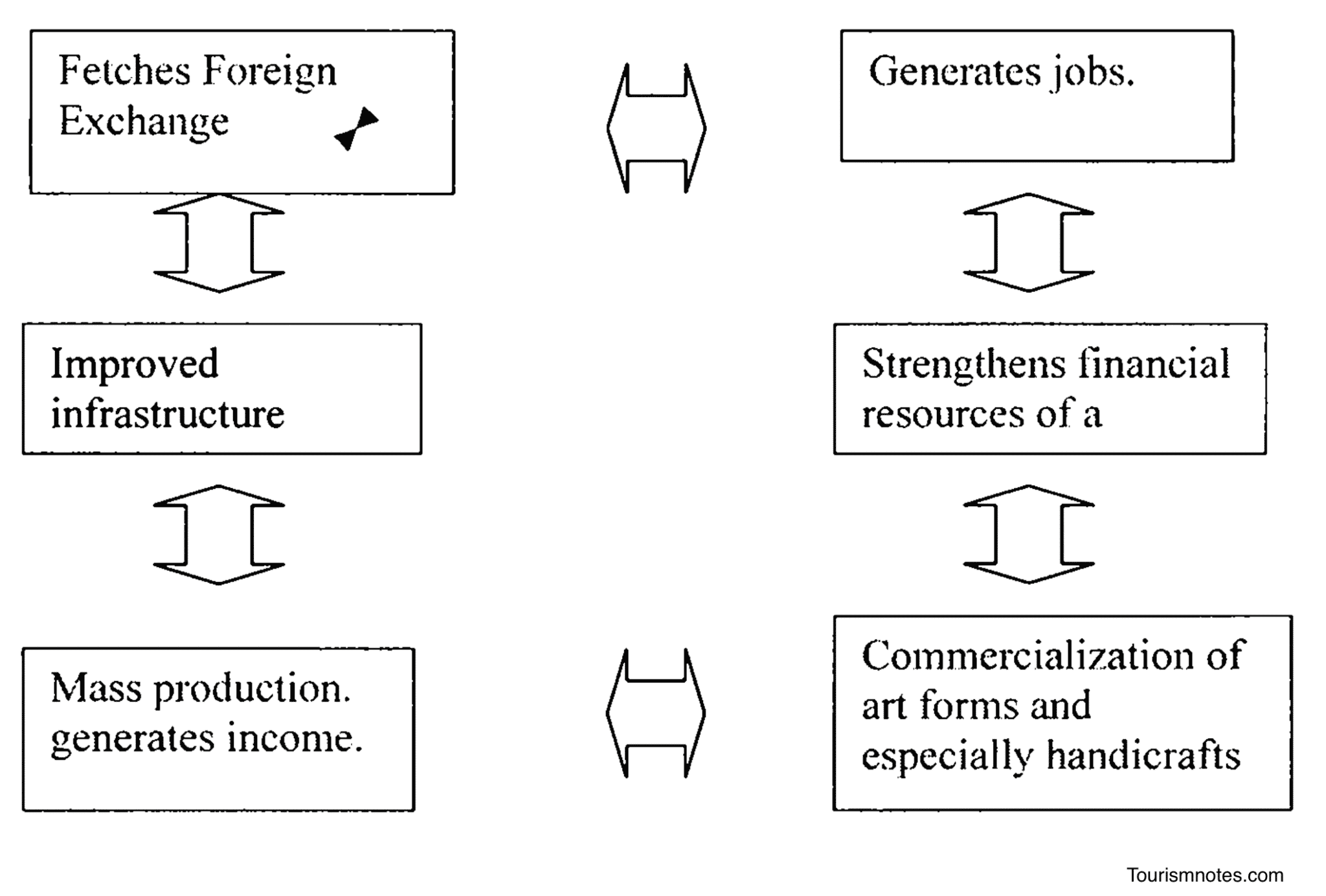
With several business-related activities associated with tourism, the industry has a tremendous potential to generate employment as well as earn foreign exchange. Many countries, such as Mauritius, Malaysia, Singapore, Fiji, and the Caribbean, whose economies are primarily driven by tourism. Tourism can contribute to the economic growth of a country in the followings ways:
Employment Generation
It creates a large number of jobs among direct services providers (such as hotels , restaurants, travel agencies , tour operators , guide and tour escorts, etc.) and among indirect services providers (such as suppliers to the hotels and restaurants, supplementary accommodation, etc.)
Infrastructure Development
Tourism spurs infrastructure development. In order to become an important commercial or pleasure destination, any location would require all the necessary infrastructure, like good connectivity via rail, road, and air transport, adequate accommodation, restaurants, a well-developed telecommunication network, and, medical facilities, among others.
Foreign Exchange
The people who travel to other countries spend a large amount of money on accommodation, transportation, sightseeing, shopping, etc. Thus, an inbound tourist is an important source of foreign exchange for any country.
The World Travel and Tourism Council (WTTC) predict in 1997 that the twenty-first-century economy would be dominated by three industries: telecommunications, information technology, and tourism. The travel and tourism industry has grown by 500 percent in the last 25 years.
Now withstanding this bright outlook and prospects, the tourism and hospitality industries are very vulnerable to the fluctuations of national economies and happenings in the world, especially terrorist attacks that have at times dealt severe blows to business.
In recent years, there have been a few setbacks in tourism, such as the terrorist siege of the Taj and Oberoi in Mumbai, India (26 November 2008); the attack on the World Trade Centre in the United States of America (11 September 2001); bombing in a hotel on the Indonesian island of Bali (12 October 2002); tsunami in Southeast Asia and South Asia on 26 December 2004, in which thousands of the lives where lost and consequently tourism was hit. Nonetheless, the sector is now getting back to business.
Impacts of Tourism
Tourism is a multi-dimensional activity. The scope of tourism activities is so wide and varied that it cannot be restricted to any particular field of activity. Tourism has ramifications in almost all sectors and is influenced by the performance of each of these sectors directly or indirectly. Tourism in any country can be an apt reflection of the nation’s economic and social endowment apart from its natural wealth.
Tourism has vast potential to bring about changes in the country’s economic, environmental, societal, and cultural edifice. Tourism has two basics: the supply of facilities and the demand for participation. The twin market forces of supply and demand interact to produce tourism patterns. These patterns are associated with economic, social, cultural, environmental, and ecological impacts.
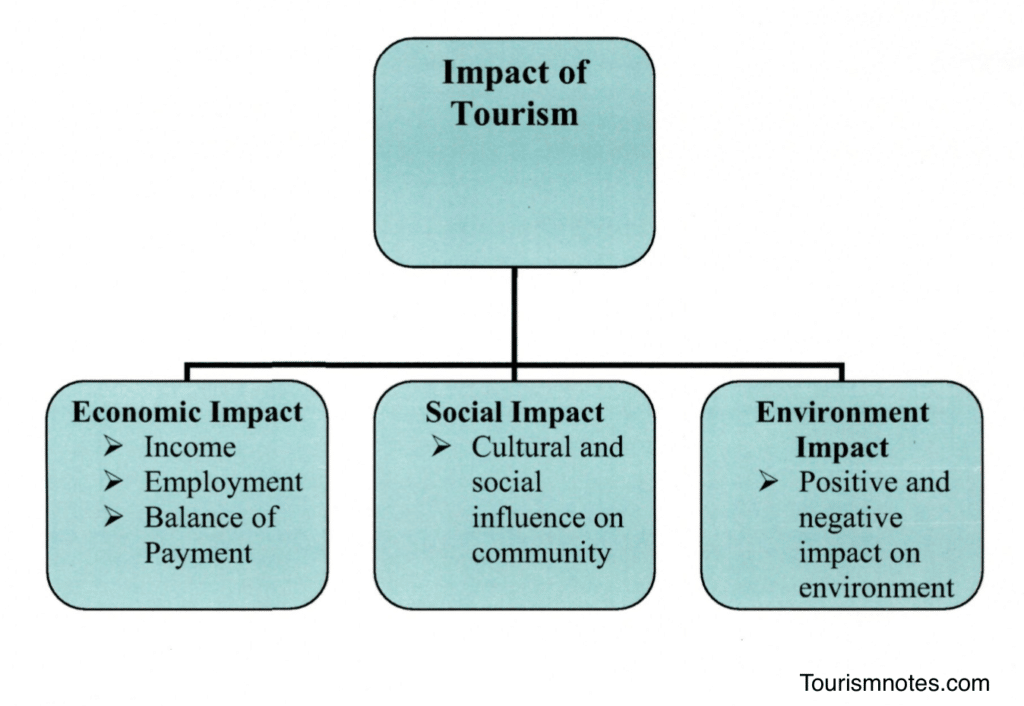
Establishing or developing a tourism industry involves expenditure, gains, costs, and benefits. If these impacts are considered from the outset of planning, strengths and opportunities can be maximized while weaknesses and threats can be minimized.
Each destination will be different in terms of tourism characteristics . The cost and benefits of tourism will vary in each destination and can change over time, depending on tourism and other activities in a destination’s local and regional context.
Economic Impacts
Tourism activities impact the economy of the country as well as the local economy of the destination.
Economics Benefits
- Tourism generates local employment, directly in the tourism sector and in the support and resource management sectors.
- Tourism stimulates profitable domestic industries, hotels and other lodging facilities, restaurants and food services, transportation systems, handicrafts, and guide services.
- Tourism generates foreign exchange for the country and injects capital and new money into the local economy.
- Tourism helps to diversify the local economy.
- Improved tourism infrastructure.
- Increase tax revenues from tourism.
Economic Costs
- Higher demand created by tourism activity may increase the price of land, housing, and a range of commodities necessary for daily life.
- Demands for health services provision and police service increase during the tourist seasons at the expense of the local tax base.
Social Impacts
Tourism also affects the society of the destination in good as well as bad ways. It benefits and costs the local communities.
Social Benefits
- The quality of a community can be enhanced by economic diversification through tourism.
- Recreational and cultural facilities created for tourism can be used by local communities as well as domestic/international visitors.
- Public space may be developed and enhanced through tourism activity.
- Tourism Enhances the local community’s esteem and provides an opportunity for greater understanding and communication among people of diverse backgrounds.
Social Costs
- Rapid tourism growth can result in the inability of local amenities and institutions to meet service demands.
- Without proper planning and management, litter, vandalism, and crime often accompany tourism development.
- Tourism can bring overcrowding and traffic congestion.
- Visitors bring with them material wealth and apparent freedom. The youths of the host community are particularly susceptible to the economic expectations these tourists bring which can result in complete disruption of traditional community ways of life.
- The community structure may change, e.g. community bonds, demographics, and institutions.
- The authenticity of the social and cultural environment can be changed to meet tourism demands.
Cultural Impacts
Tourism activities also affect the culture of the host country. There are many positive and negative cultural impacts of tourism.
Cultural Benefits
- Tourism can enhance local cultural awareness.
- Tourism can generate revenue to help pay for the preservation of archaeological sites, historic buildings, and districts.
- Despite criticism about the alteration of cultures to unacceptable levels, the sharing of cultural knowledge and experience can be beneficial for hosts and guests of tourism destinations and can result in the revival of local traditions and crafts.
Cultural Costs
- Youth in the community begin to emulate the speech and attire of tourists.
- Historic sites can be damaged through tourism development and pressures.
- There can be long-term damage to cultural traditions and the erosion of cultural values, resulting in cultural change beyond a level acceptable to the host destination.
Environmental Impact
Tourism impacts the environment in positive as well as negative ways. These impacts are following below.
Environmental Benefits
- Parks and nature preserves may be created and ecological preservation supported as a necessity for nature-based tourism.
- Improved waste management can be achieved.
- Increased awareness and concern for the environment can result from nature-based tourism activities and development.
Environmental Costs
- A negative change in the physical integrity of the area.
- Rapid development, over-development, and overcrowding can forever change the physical environment and ecosystems of an area.
- Degradation of parks and preserves.
Industries Related To Tourism
Over the years, tourism has become a popular global activity. Depending upon the nature and purpose of their travel, tourists, need and demand certain facilities and services. This has given rise to a wide range of commercial activities that have acquired industry proportions. Thus travel and tourism nowadays represent a broad range of related industries.
Hotels are a commercial establishment that provides accommodation, meals, and other guest services. In the travel and tourism industry, the hotel industry plays a very significant role, as all tourists need a place to stay at their destinations, and require many more services and facilities to suit their specific needs and tastes.
Restaurants
Restaurants are retail establishments that serve prepared food and beverages to customers. In the travel and tourism industry, restaurants and other food and beverage outlets are very important as tourists like to experiment with the local cuisines of the places they are visiting.
Retail and Shopping
The retail industry is very important as tourists shop for their day-to-day necessities as well as look for mementos and souvenirs. In recent years, some cities in the world have been promoted as shopping destinations to attract people with a penchant for shopping by offering various products, such as garments, electronic goods, jewelry, and antiques. New York, Paris, London, and Milan in Italy are famous as fashion havens of the world.
Transportation
It is the movement of people and goods from one place to another. A well-developed transport industry, as well as infrastructure, is integral to the success of any travel and tourism enterprise.
Travel Agencies
A travel agency is a retailing business that sells travel-related products and services, particularly package tours, to customers on the behalf of suppliers such as airlines, car rentals, cruise liners, hotels, railways, and sightseeing.
Travel agencies play a very important role as they plan out the itinerary of their clients and make the necessary arrangements for their travel, stay, and sightseeing, besides facilitating their passport, visa, etc.
Tour Operators
A tour operator assembles the various elements of a tour. It typically combines tour and travel components to create a holiday. Tour operators play an important role in the travel and tourism industry.
Tourist Destinations
A tourist attraction is a place of interest for tourists, typically for its inherent or exhibited cultural value, historical significance, nature or building beauty or amusement opportunities. These are the basic fundamentals of the tourism industry.
Cultural Industries
Cultural or creative industries are responsible for the creation, production, and distribution of goods and services that are cultural in nature and usually protected by intellectual property rights. As tourists like to visit places of cultural significance and soak in the culture of the area, the cultural industry is very important to travel and tourism.
Leisure, Recreation, and Sport
Leisure or free time is a period of time spent out of work and essential domestic activity. Recreation or fun is spending time in a manner designed for therapeutic refreshment of the body or mind. While leisure is more like a form of entertainment or rest, recreation requires active participation in a refreshing and diverting manner.
As people in the world’s wealthier regions lead an increasingly sedentary lifestyle, the need for recreation has increased. These play a significant role in the travel and tourism sector.
Tourism Products
A tourism/tourist product can be defined as the sum of the physical and psychological satisfaction it provides to tourists, during their ‘traveling and sojourn’ en route at the destinations.
Since the travel and tourism industry is an agglomeration of too many sectors that promote travel-related services. These sectors are referred to as travel vendors and their services and goods are called ‘travel products’. A tourism product includes five main components such as physical plant, services, hospitality, freedom of choice, and a sense of involvement.
Thus, whatever the natural and man-made resources and services brought about the consumption of tourists are called tourism products .
Charecterstatics Of Tourism Products
By now, you must have understood what a tourism product is. Now let us look at some of its characteristics:-
1) Intangible : Tourism is an intangible product means tourism is such a kind of product that can not be touched or seen and there is no transfer of ownership, But the facilities are available for a specified time and for a specified use. For e.g. a room in the hotel is available for a specified time.
2) Psychological : The main motive to purchase a tourism products is to satisfy the psychological need after using the product, by getting an experience while interacting with a new environment. And experiences also motivate others to purchase that product.
3) Highly Perishable : Tourism product is highly perishable in nature means one can not store the product for a long time. Production and consumption take place while a tourist is available. If the product remains unused, the chances are lost i.e. if tourists do not purchase it.
A travel agent or tour operator who sells a tourism product cannot store it. Production can only take place if the customer is actually present. And once consumption begins, it cannot be stopped, interrupted, or modified. If the product remains unused, the chances are lost i.e. if tourists do not visit a particular place, the opportunity at that time is lost. It is due to tourism reason that heavy discount is offered by hotels and transport-generating organizations during the offseason.
4) Composite Product : Tourist product is a combination of different products. It has not a single entity in itself. In the experience of a visit to a particular place, various service providers contribute like transportation The tourist product cannot be provided by a single enterprise, unlike a manufactured product.
The tourist product covers the complete experience of a visit to a particular place. And many providers contribute to the tourism experience. For instance, the airline supplies seats, a hotel provides rooms and restaurants, travel agents make bookings for stay and sightseeing, etc.
5) Unstable Demand : Tourism demand is influenced by seasonal, economic political, and other factors. There are certain times of the year that see greater demand than others. At these times there is a greater strain on services like hotel bookings, employment, the transport system, etc.

Want to create or adapt books like this? Learn more about how Pressbooks supports open publishing practices.
Chapter 1. History and Overview
1.1 What is Tourism?
Before engaging in a study of tourism , let’s have a closer look at what this term means.
Definition of Tourism
There are a number of ways tourism can be defined, and for this reason, the United Nations World Tourism Organization (UNWTO) embarked on a project from 2005 to 2007 to create a common glossary of terms for tourism. It defines tourism as follows:
Tourism is a social, cultural and economic phenomenon which entails the movement of people to countries or places outside their usual environment for personal or business/professional purposes. These people are called visitors (which may be either tourists or excursionists; residents or non-residents) and tourism has to do with their activities, some of which imply tourism expenditure (United Nations World Tourism Organization, 2008).
Using this definition, we can see that tourism is not just the movement of people for a number of purposes (whether business or pleasure), but the overall agglomeration of activities, services, and involved sectors that make up the unique tourist experience.
Tourism, Travel, and Hospitality: What are the Differences?
It is common to confuse the terms tourism , travel , and hospitality or to define them as the same thing. While tourism is the all-encompassing umbrella term for the activities and industry that create the tourist experience, the UNWTO (2020) defines travel as the activity of moving between different locations often for any purpose but more so for leisure and recreation (Hall & Page, 2006). On the other hand, hospitality can be defined as “the business of helping people to feel welcome and relaxed and to enjoy themselves” (Discover Hospitality, 2015, p. 3). Simply put, the hospitality industry is the combination of the accommodation and food and beverage groupings, collectively making up the largest segment of the industry (Go2HR, 2020). You’ll learn more about accommodations and F & B in Chapter 3 and Chapter 4 , respectively.
Definition of Tourist and Excursionist
Building on the definition of tourism, a commonly accepted description of a tourist is “someone who travels at least 80 km from his or her home for at least 24 hours, for business or leisure or other reasons” (LinkBC, 2008, p.8). The United Nations World Tourism Organization (1995) helps us break down this definition further by stating tourists can be:
- Domestic (residents of a given country travelling only within that country)
- Inbound (non-residents travelling in a given country)
- Outbound (residents of one country travelling in another country)
Excursionists on the other hand are considered same-day visitors (UNWTO, 2020). Sometimes referred to as “day trippers.” Understandably, not every visitor stays in a destination overnight. It is common for travellers to spend a few hours or less to do sightseeing, visit attractions, dine at a local restaurant, then leave at the end of the day.
The scope of tourism, therefore, is broad and encompasses a number of activities and sectors.
Spotlight On: United Nations World Tourism Organization (UNWTO)
UNWTO is the United Nations agency responsible “for the promotion of responsible, sustainable and universally accessible tourism” (UNWTO, 2014b). Its membership includes 159 countries and over 500 affiliates such as private companies, research and educational institutions, and non-governmental organizations. It promotes tourism as a way of developing communities while encouraging ethical behaviour to mitigate negative impacts. For more information, visit the UNWTO website .
NAICS: The North American Industry Classification System
Given the sheer size of the tourism industry, it can be helpful to break it down into broad industry groups using a common classification system. The North American Industry Classification System (NAICS) was jointly created by the Canadian, US, and Mexican governments to ensure common analysis across all three countries (British Columbia Ministry of Jobs, Tourism and Skills Training, 2013a). The tourism-related groupings created using NAICS are (in alphabetical order):
- Accommodation
- Food and beverage services (commonly known as “F & B”)
- Recreation and entertainment
- Transportation
- Travel services
These industry groups (also commonly known as sectors) are based on the similarity of the “labour processes and inputs” used for each (Government of Canada, 2013). For instance, the types of employees and resources required to run an accommodation business whether it be a hotel, motel, or even a campground are quite similar. All these businesses need staff to check in guests, provide housekeeping, employ maintenance workers, and provide a place for people to sleep. As such, they can be grouped together under the heading of accommodation. The same is true of the other four groupings, and the rest of this text explores these industry groups, and other aspects of tourism, in more detail.

It is typical for the entire tourist experience to involve more than one sector. The combination of sectors that supply and distribute the needed tourism products, services, and activities within the tourism system is called the Tourism Supply Chain. Often, these chains of sectors and activities are dependent upon each other’s delivery of products and services. Let’s look at a simple example below that describes the involved and sometimes overlapping sectoral chains in the tourism experience:
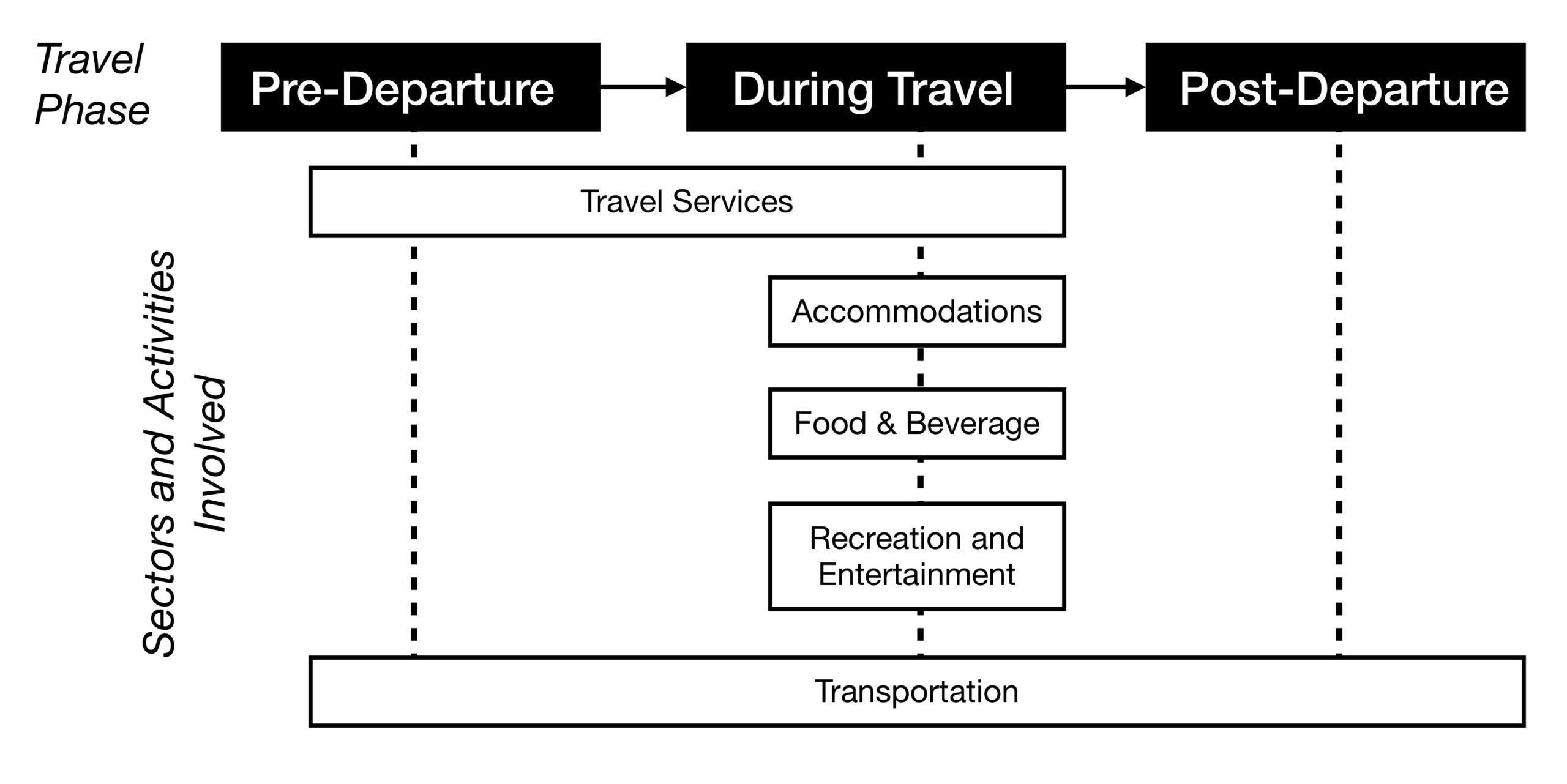
Before we seek to understand the five tourism sectors in more detail, it’s important to have an overview of the history and impacts of tourism to date.
Long Descriptions
Figure 1.2 long description: Diagram showing the tourism supply chain. This includes the phases of travel and the sectors and activities involved during each phase.
There are three travel phases: pre-departure, during travel, and post-departure.
Pre-departure, tourists use the travel services and transportation sectors.
During travel, tourists use the travel services, accommodations, food and beverage, recreation and entertainment, and transportation sectors.
Post-departure, tourists use the transportation sector.
[Return to Figure 1.2]
Media Attributions
- Front Desk by Staying LEVEL is licensed under a CC BY-NC 4.0 Licence .
Tourism according the the UNWTO is a social, cultural and economic phenomenon which entails the movement of people to countries or places outside their usual environment for personal or business/professional purposes.
UN agency responsible for promoting responsible, sustainable, and universally accessible tourism worldwide.
Moving between different locations for leisure and recreation.
The accommodations and food and beverage industry groupings.
someone who travels at least 80 km from his or her home for at least 24 hours, for business or leisure or other reasons
A same-day visitor to a destination. Their trip typically ends on the same day when they leave the destination.
A way to group tourism activities based on similarities in business practices, primarily used for statistical analysis.
Introduction to Tourism and Hospitality in BC - 2nd Edition Copyright © 2015, 2020, 2021 by Morgan Westcott and Wendy Anderson, Eds is licensed under a Creative Commons Attribution 4.0 International License , except where otherwise noted.
Share This Book

What is international tourism and why is it important?
Disclaimer: Some posts on Tourism Teacher may contain affiliate links. If you appreciate this content, you can show your support by making a purchase through these links or by buying me a coffee . Thank you for your support!
The International tourism industry is stronger than ever before. Destinations around the world have developed their economies around international tourism and they are thriving (minus the ongoing Coronavirus pandemic, but I am confident that tourism will return so I am going to put that to one side for now). But what does it all mean?
In this article I am going to introduce you to the exciting world of international tourism- the industry that I have lived and breathed for so many years. The industry that I love. So here goes…
What is international tourism?
International tourism definitions, foreign exchange earnings, contribution to government revenues, employment generation, contribution to local economies, overall economy boost, preserving local culture, strengthening communities, provision of social services, commercialisation of culture and art, revitalisation of culture and art, preservation of heritage, empowering communities, protecting nature, international tourism statistics, international tourism: conclusion, further reading.
Tourism is the generic term used to cover both demand and supply that has been adopted in a variety of forms and used throughout the world.
International tourism essentially refers to the activities undertaken by visitors, also known as the visitor economy. The tourism industry encompasses all activity that takes place within the visitor economy.
This includes activities that are directly related to the tourist, such as staying in a hotel, ordering a meal or visiting a tourist attraction. It also includes indirect activities, such as the transport company which delivers the food to the restaurant in which the tourist eats or the laundry company that has a contract with the hotel for cleaning bed sheets.
It is largely due to the indirect contributions to tourism, that defining and measuring the tourism industry is so difficult!
Tourism is a phenomenon with no universally accepted definition, owing to the complexity and individualism of the travellers themselves and the activities that they choose to undertake.
The most widely utilised definition of tourism, proposed by the World Trade Organisation (WTO) and United States (UN) Nations Statistics Division (1994), prescribes that in order to qualify as a tourist one must travel and remain in a place outside of their usual residential environment for not more than one consecutive year for leisure, business or other purposes.
Matheison and Wall (1982) on the other hand, do not impose a timeframe, simply stating that one must travel to a destination temporarily.
Leiper (1979) believed that defining tourism is more complex than this, proposing that there are three approaches that can be taken. The economic stance focuses on tourism as a business, the technical stance focusses on the tourist in order to provide a common basis by which to collect data and the holistic stance attempts to include the entire essence of the subject.
The Cambridge Dictionary define tourism quite simply as; ‘the business of providing services such as transport, places to stay or entertainment for people who are on holiday’.
As there is no universal definition for the term ‘international tourism’, for the purposes of this article I will define it as follows:
‘International tourism is the act of travelling to another country other than where you live for no more than one year for purposes of leisure or business’.
Why is international tourism important?
International tourism is hugely important. There are a number of key reasons for this that I will outline below.
Value to the economy
International tourism can help economies to bring in money in a number of different ways. Below I have provided some examples of the positive economic impacts of tourism .
The importance of international tourism is demonstrated through foreign exchange earnings.
Tourism expenditures generate income to the host economy. The money that the country makes from tourism can then be reinvested in the economy.
How a destination manages their finances differs around the world; some destinations may spend this money on growing their tourism industry further, some may spend this money on public services such as education or healthcare and some destinations suffer extreme corruption so nobody really knows where the money ends up!
Some currencies are worth more than others and so some countries will target tourists from particular areas. Currencies that are strong are generally the most desirable currencies. This typically includes the British Pound, American, Australian and Singapore Dollar and the Euro .
Tourism is one of the top five export categories for as many as 83% of countries and is a main source of foreign exchange earnings for at least 38% of countries.
The importance of international tourism is also demonstrated through the money that is raised and contributed to government revenues. Tourism can help to raise money that it then invested elsewhere by the Government. There are two main ways that this money is accumulated.
Direct contributions are generated by taxes on incomes from tourism employment and tourism businesses and things such as departure taxes.
According to the World Tourism Organisation, the direct contribution of Travel & Tourism to GDP in 2018 was $2,750.7billion (3.2% of GDP). This is forecast to rise by 3.6% to $2,849.2billion in 2019.
Indirect contributions come from goods and services supplied to tourists which are not directly related to the tourism industry.
There is also the income that is generated through induced contributions . This accounts for money spent by the people who are employed in the tourism industry. This might include costs for housing, food, clothing and leisure Activities amongst others. This will all contribute to an increase in economic activity in the area where tourism is being developed.
The importance of international tourism can be demonstrated through employment generation.
The rapid expansion of international tourism has led to significant employment creation. From hotel managers to theme park operatives to cleaners, tourism creates many employment opportunities. Tourism supports some 7% of the world’s workers.
There are two types of employment in the tourism industry: direct and indirect.
Direct employment includes jobs that are immediately associated with the tourism industry. This might include hotel staff, restaurant staff or taxi drivers, to name a few.
Indirect employment includes jobs which are not technically based in the tourism industry, but are related to the tourism industry.
It is because of these indirect relationships, that it is very difficult to accurately measure the precise economic value of tourism, and some suggest that the actual economic benefits of tourism may be as high as double that of the recorded figures!
The importance of international tourism can be further seen through the contributions to local economies.
All of the money raised, whether through formal or informal means, has the potential to contribute to the local economy.
If sustainable tourism is demonstrated, money will be directed to areas that will benefit the local community most. There may be pro-poor tourism initiatives (tourism which is intended to help the poor) or volunteer tourism projects. The government may reinvest money towards public services and money earned by tourism employees will be spent in the local community. This is known as the multiplier effect.
International tourism boosts the economy exponentially.
This is partly because of the aforementioned jobs that tourism creates, but also because of the temporary addition to the consumer population that occurs when someone travels to a new place.
Just think: when you travel, you’re spending money. You’re paying to stay in a hotel or hostel in a certain area – then you’re eating in local restaurants, using local public transport, buying souvenirs and ice cream and new flip flops. As a tourist, you are contributing to the global economy every time you book and take a trip.
For some towns, cities and even whole countries, the importance of international tourism is greater than for others. In some cases, it is the main source of income.
For example, according to the World Travel and Tourism Council, tourism accounts for almost 40% of the Maldives’ total GDP. In comparison, it’s less than 4% in the UK and even lower in the US! In the Seychelles the number is just over 26% while in the British Virgin Islands it is over 35% – so tourism is vastly important in these nations.
Other posts that you might be interested in: – What is tourism? A definition of tourism – The history of tourism – The structure of the tourism industry – Stakeholders in tourism – Inbound tourism explained: What, why and where – What is ABTA and how does it work? – Outbound tourism | Understanding the basics
Value to society
The importance of international tourism is not only recognised through economic factors, but there are also many positive social impacts of tourism that play an important part. Below I will outline some of the social gains from tourism.
It is the local culture that the tourists are often coming to visit and this is another way to demonstrate the importance of international tourism.
Tourists visit Beijing to learn more about the Chinese Dynasties. Tourists visit Thailand to taste authentic Thai food. Tourists travel to Brazil to go to the Rio Carnival, to mention a few…
Many destinations will make a conserved effort to preserve and protect the local culture. This often contributes to the conservation and sustainable management of natural resources, the protection of local heritage, and a renaissance of indigenous cultures, cultural arts and crafts.
The importance of international tourism can also be demonstrated through the strengthening of communities.
Events and festivals of which local residents have been the primary participants and spectators are often rejuvenated and developed in response to tourist interest.
The jobs created by international tourism can also be a great boost for the local community. Aside from the economic impacts created by enhanced employment prospects, people with jobs are happier and more social than those without a disposable income.
Local people can also increase their influence on tourism development, as well as improve their job and earnings prospects, through tourism-related professional training and development of business and organisational skills.
The importance of international tourism is shown through the provision of social services in the host community.
The international tourism industry requires many facilities/ infrastructure to meet the needs of the tourist. This often means that many developments in an area as a result of tourism will be available for use by the locals also.
Local people often gained new roads, new sewage systems, new playgrounds, bus services etc as a result of tourism. This can provide a great boost to their quality of life and is a great example of a positive social impact of tourism.
International tourism can see rise to many commercial business, which can be a positive social impact of tourism. This helps to enhance the community spirit as people tend to have more disposable income as a result.
These businesses may also promote the local cultures and arts. Museums, shows and galleries are fantastic way to showcase the local customs and traditions of a destination. This can help to promote/ preserve local traditions.
Some destinations will encourage local cultures and arts to be revitalised. This may be in the form of museum exhibitions, in the way that restaurants and shops are decorated and in the entertainment on offer, for example.
This may help promote traditions that may have become distant.
Another reason for the importance of international tourism is the preservation of heritage. Many tourists will visit the destination especially to see its local heritage. It is for this reason that many destinations will make every effort to preserve its heritage.
This could include putting restrictions in place or limiting tourist numbers, if necessary. This is often an example of careful tourism planning and sustainable tourism management.
International tourism can, if managed well, empower communities. While it is important to consider the authenticity in tourism and take some things with a pinch of salt, know that tourism can empower communities.
Small villages in far off lands are able to profit from selling their handmade goods. This, in turn, puts food on the table. This leads to healthier families and more productivity and a happier population .
Value to the environment
Whilst most media coverage involving international tourism and the environment tends to be negative, there are some positives that can come from it: demonstrating the importance of tourism once again.
Some people think that international tourism is what kills nature. And while this could so easily be true, it is important to note that the tourism industry is and always has been a big voice when it comes to conservation and the protection of animals and nature. Tourism organisations and travel operators often run (and donate to) fundraisers.
As well as this, visitors to certain areas can take part in activities that aim to sustain the local scenery. It’s something a bit different, too! You and your family can go on a beach clean up walk in Spain or do something similar in the UAE . There are a lot of ways in which tourism actually helps the environment, rather than hindering it!
Tourism brings with it huge economic potential for a destination that wishes to develop their tourism industry. Employment, currency exchange, imports and taxes are just a few of the ways that tourism can bring money into a destination.
In recent years, tourism numbers have increased globally at exponential rates, as shown in the World Tourism Organisation data below. There are a number of reasons for this growth including improvements in technology, increases in disposable income, the growth of budget airlines and consumer desires to travel further, to new destinations and more often.
Here are a few statistics providing by the UN and Statistica:

Here are a few facts about the economic importance of the tourism industry globally:
- The tourism economy represents 5 percent of world GDP
- Tourism contributes to 6-7 percent of total employment
- International tourism ranks fourth (after fuels, chemicals and automotive products) in global exports
- The tourism industry is valued at US$1trillion a year
- Tourism accounts for 30 percent of the world’s exports of commercial services
- Tourism accounts for 6 percent of total exports
- 1.4billion international tourists were recorded in 2018 (UNWTO)
- In over 150 countries, tourism is one of five top export earners
- Tourism is the main source of foreign exchange for one-third of developing countries and one-half of less economically developed countries (LEDCs)
There is a wealth of data about the economic value of tourism worldwide, with lots of handy graphs and charts in the United Nations Economic Impact Report .
International tourism is arguably the largest industry in the world. There are many benefits of international tourism to local economies as well as society and the environment. The many components of tourism that make up the industry are integral to livelihoods the world over.
- An Introduction to Tourism : a comprehensive and authoritative introduction to all facets of tourism including: the history of tourism; factors influencing the tourism industry; tourism in developing countries; sustainable tourism; forecasting future trends.
- The Business of Tourism Management : an introduction to key aspects of tourism, and to the practice of managing a tourism business.
- Tourism Management: An Introduction : gives its reader a strong understanding of the dimensions of tourism, the industries of which it is comprised, the issues that affect its success, and the management of its impact on destination economies, environments and communities.
Liked this article? Click to share!

By Bastian Herre, Veronika Samborska and Max Roser
Tourism has massively increased in recent decades. Aviation has opened up travel from domestic to international. Before the COVID-19 pandemic, the number of international visits had more than doubled since 2000.
Tourism can be important for both the travelers and the people in the countries they visit.
For visitors, traveling can increase their understanding of and appreciation for people in other countries and their cultures.
And in many countries, many people rely on tourism for their income. In some, it is one of the largest industries.
But tourism also has externalities: it contributes to global carbon emissions and can encroach on local environments and cultures.
On this page, you can find data and visualizations on the history and current state of tourism across the world.
Interactive Charts on Tourism
Cite this work.
Our articles and data visualizations rely on work from many different people and organizations. When citing this topic page, please also cite the underlying data sources. This topic page can be cited as:
BibTeX citation
Reuse this work freely
All visualizations, data, and code produced by Our World in Data are completely open access under the Creative Commons BY license . You have the permission to use, distribute, and reproduce these in any medium, provided the source and authors are credited.
The data produced by third parties and made available by Our World in Data is subject to the license terms from the original third-party authors. We will always indicate the original source of the data in our documentation, so you should always check the license of any such third-party data before use and redistribution.
All of our charts can be embedded in any site.
Our World in Data is free and accessible for everyone.
Help us do this work by making a donation.

Want to create or adapt books like this? Learn more about how Pressbooks supports open publishing practices.
Chapter 1. History and Overview
1.1 What is Tourism?
Before engaging in a study of tourism , let’s have a closer look at what this term means.
Definition of Tourism
There are a number of ways tourism can be defined, and for this reason, the United Nations World Tourism Organization (UNWTO) embarked on a project from 2005 to 2007 to create a common glossary of terms for tourism. It defines tourism as follows:
Tourism is a social, cultural and economic phenomenon which entails the movement of people to countries or places outside their usual environment for personal or business/professional purposes. These people are called visitors (which may be either tourists or excursionists; residents or non-residents) and tourism has to do with their activities, some of which imply tourism expenditure (United Nations World Tourism Organization, 2008).
Using this definition, we can see that tourism is not just the movement of people for a number of purposes (whether business or pleasure), but the overall agglomeration of activities, services, and involved sectors that make up the unique tourist experience.
Tourism, Travel, and Hospitality: What are the Differences?
It is common to confuse the terms tourism , travel , and hospitality or to define them as the same thing. While tourism is the all-encompassing umbrella term for the activities and industry that create the tourist experience, the UNWTO (2020) defines travel as the activity of moving between different locations often for any purpose but more so for leisure and recreation (Hall & Page, 2006). On the other hand, hospitality can be defined as “the business of helping people to feel welcome and relaxed and to enjoy themselves” (Discover Hospitality, 2015, p. 3). Simply put, the hospitality industry is the combination of the accommodation and food and beverage groupings, collectively making up the largest segment of the industry (Go2HR, 2020). You’ll learn more about accommodations and F & B in Chapter 3 and Chapter 4 , respectively.
Definition of Tourist and Excursionist
Building on the definition of tourism, a commonly accepted description of a tourist is “someone who travels at least 80 km from his or her home for at least 24 hours, for business or leisure or other reasons” [1] . The United Nations World Tourism Organization (1995) helps us break down this definition further by stating tourists can be:
- Domestic (residents of a given country travelling only within that country)
- Inbound (non-residents travelling in a given country)
- Outbound (residents of one country travelling in another country)
Excursionists on the other hand are considered same-day visitors (UNWTO, 2020). Sometimes referred to as “day trippers.” Understandably, not every visitor stays in a destination overnight. It is common for travellers to spend a few hours or less to do sightseeing, visit attractions, dine at a local restaurant, then leave at the end of the day.
The scope of tourism, therefore, is broad and encompasses a number of activities and sectors.
Spotlight On: United Nations World Tourism Organization (UNWTO)
UNWTO is the United Nations agency responsible “for the promotion of responsible, sustainable and universally accessible tourism” (UNWTO, 2014b). Its membership includes 159 countries and over 500 affiliates such as private companies, research and educational institutions, and non-governmental organizations. It promotes tourism as a way of developing communities while encouraging ethical behaviour to mitigate negative impacts. For more information, visit the UNWTO website .
The North American Industry Classification System (NAICS). Given the sheer size of the tourism industry, it can be helpful to break it down into broad industry groups using a common classification system. The North American Industry Classification System (NAICS) was jointly created by the Canadian, US, and Mexican governments to ensure common analysis across all three countries (British Columbia Ministry of Jobs, Tourism and Skills Training, 2013a). The tourism-related groupings created using NAICS are (in alphabetical order):
- Accommodation
- Food and beverage services (commonly known as “F & B”)
- Recreation and entertainment
- Transportation
- Travel services
These industry groups (also commonly known as sectors) are based on the similarity of the “labour processes and inputs” used for each (Government of Canada, 2013). For instance, the types of employees and resources required to run an accommodation business whether it be a hotel, motel, or even a campground are quite similar. All these businesses need staff to check in guests, provide housekeeping, employ maintenance workers, and provide a place for people to sleep. As such, they can be grouped together under the heading of accommodation. The same is true of the other four groupings, and the rest of this text explores these industry groups, and other aspects of tourism, in more detail.

It is typical for the entire tourist experience to involve more than one sector. The combination of sectors that supply and distribute the needed tourism products, services, and activities within the tourism system is called the Tourism Supply Chain. Often, these chains of sectors and activities are dependent upon each other’s delivery of products and services. Let’s look at a simple example below that describes the involved and sometimes overlapping sectoral chains in the tourism experience:
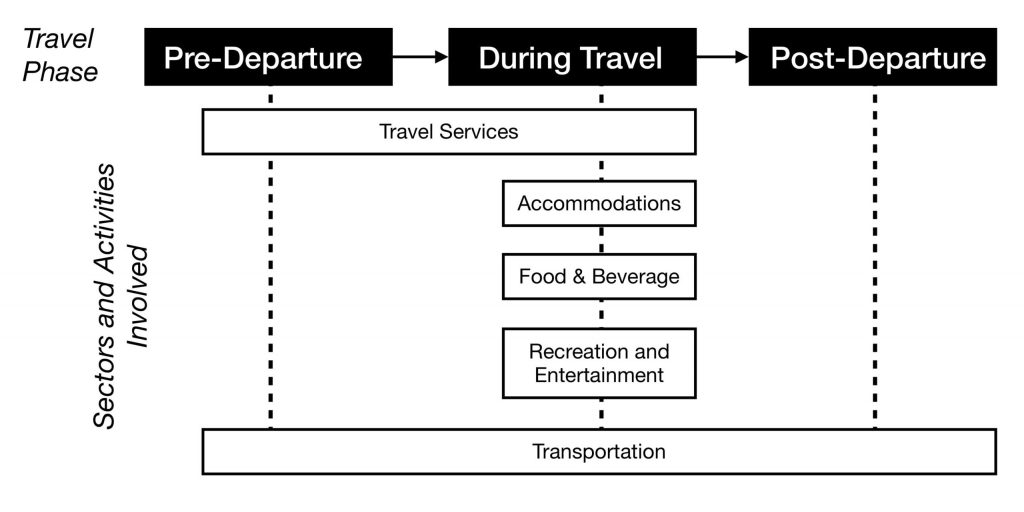
Before we seek to understand the five tourism sectors in more detail, it’s important to have an overview of the history and impacts of tourism to date.
Media Attributions
Front Desk © Staying LEVEL is licensed under a CC BY-NC (Attribution NonCommercial) license
- (LinkBC, 2008, p.8) ↵
Tourism according the the UNWTO is a social, cultural and economic phenomenon which entails the movement of people to countries or places outside their usual environment for personal or business/professional purposes.
UN agency responsible for promoting responsible, sustainable, and universally accessible tourism worldwide.
Moving between different locations for leisure and recreation.
The accommodations and food and beverage industry groupings.
someone who travels at least 80 km from his or her home for at least 24 hours, for business or leisure or other reasons
A same-day visitor to a destination. Their trip typically ends on the same day when they leave the destination.
A way to group tourism activities based on similarities in business practices, primarily used for statistical analysis.
Introduction to Tourism Copyright © 2020 by NSCC is licensed under a Creative Commons Attribution 4.0 International License , except where otherwise noted.
Share This Book
UN Tourism | Bringing the world closer
The first global dashboard for tourism insights.

- UN Tourism Tourism Dashboard
- Language Services
- Publications
share this content
- Share this article on facebook
- Share this article on twitter
- Share this article on linkedin
UN Tourism Data Dashboard
The UN Tourism Data Dashboard – provides statistics and insights on key indicators for inbound and outbound tourism at the global, regional and national levels. Data covers tourist arrivals, tourism share of exports and contribution to GDP, source markets, seasonality and accommodation (data on number of rooms, guest and nights)
Two special modules present data on the impact of COVID 19 on tourism as well as a Policy Tracker on Measures to Support Tourism
The UN Tourism/IATA Destination Tracker
Un tourism tourism recovery tracker.

UN Tourism Tourism Data Dashboard
- International tourist arrivals and receipts and export revenues
- International tourism expenditure and departures
- Seasonality
- Tourism Flows
- Accommodation
- Tourism GDP and Employment
- Domestic Tourism
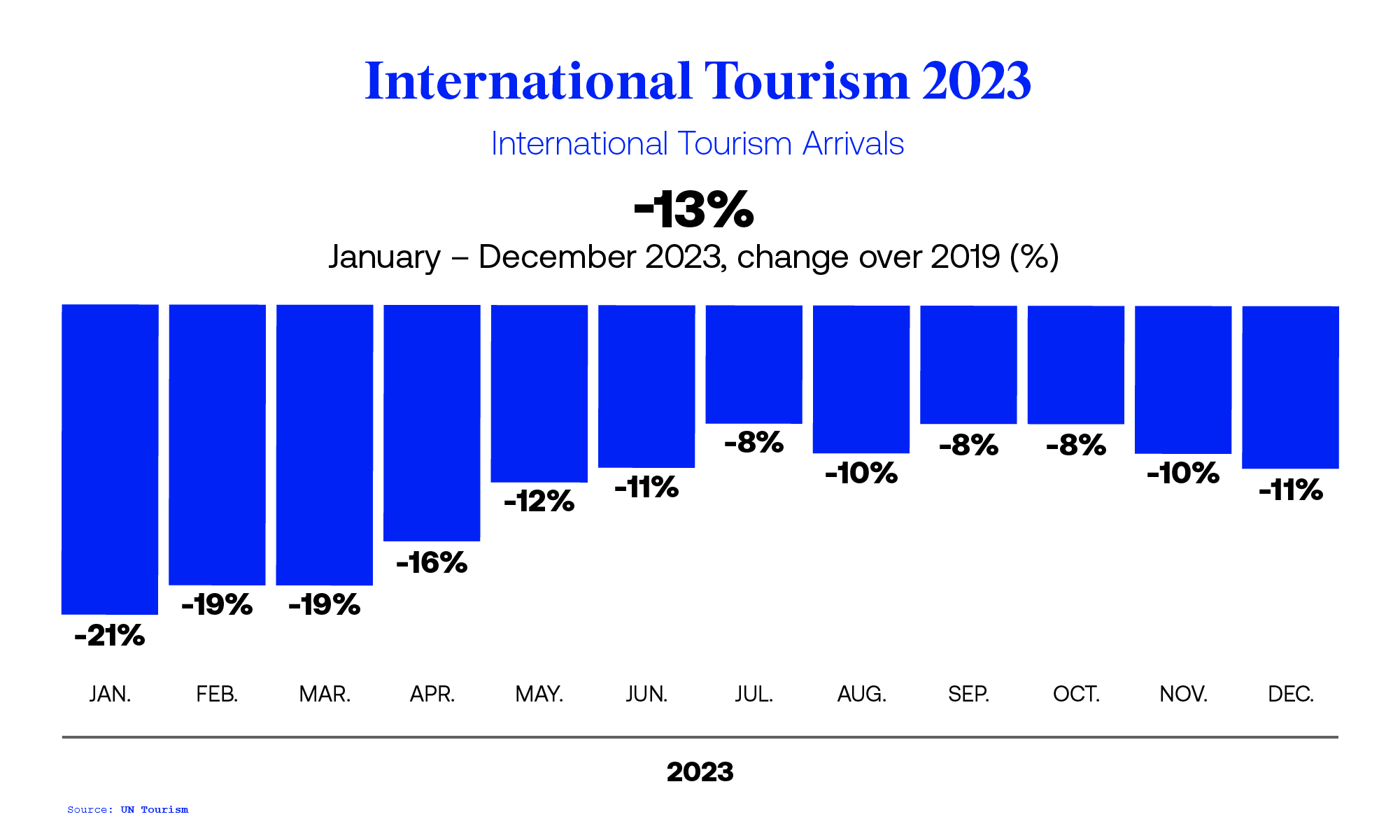
International Tourism and COVID-19
- The pandemic generated a loss of 2.6 billion international arrivals in 2020, 2021 and 2022 combined
- Export revenues from international tourism dropped 62% in 2020 and 59% in 2021, versus 2019 (real terms) and then rebounded in 2022, remaining 34% below pre-pandemic levels.
- The total loss in export revenues from tourism amounts to USD 2.6 trillion for that three-year period.
- International tourist arrivals reached 88% of pre-pandemic levels in January-December 2023
COVID-19: Measures to Support Travel and Tourism
Travel, Tourism & Hospitality
Global tourism industry - statistics & facts
What are the leading global tourism destinations, digitalization of the global tourism industry, how important is sustainable tourism, key insights.
Detailed statistics
Total contribution of travel and tourism to GDP worldwide 2019-2033
Number of international tourist arrivals worldwide 1950-2023
Global leisure travel spend 2019-2022
Editor’s Picks Current statistics on this topic
Current statistics on this topic.
Leading global travel markets by travel and tourism contribution to GDP 2019-2022
Travel and tourism employment worldwide 2019-2033
Related topics
Recommended.
- Hotel industry worldwide
- Travel agency industry
- Sustainable tourism worldwide
- Travel and tourism in the U.S.
- Travel and tourism in Europe
Recommended statistics
- Basic Statistic Total contribution of travel and tourism to GDP worldwide 2019-2033
- Basic Statistic Travel and tourism: share of global GDP 2019-2033
- Basic Statistic Leading global travel markets by travel and tourism contribution to GDP 2019-2022
- Basic Statistic Global leisure travel spend 2019-2022
- Premium Statistic Global business travel spending 2001-2022
- Premium Statistic Number of international tourist arrivals worldwide 1950-2023
- Basic Statistic Number of international tourist arrivals worldwide 2005-2023, by region
- Basic Statistic Travel and tourism employment worldwide 2019-2033
Total contribution of travel and tourism to gross domestic product (GDP) worldwide in 2019 and 2022, with a forecast for 2023 and 2033 (in trillion U.S. dollars)
Travel and tourism: share of global GDP 2019-2033
Share of travel and tourism's total contribution to GDP worldwide in 2019 and 2022, with a forecast for 2023 and 2033
Total contribution of travel and tourism to GDP in leading travel markets worldwide in 2019 and 2022 (in billion U.S. dollars)
Leisure tourism spending worldwide from 2019 to 2022 (in billion U.S. dollars)
Global business travel spending 2001-2022
Expenditure of business tourists worldwide from 2001 to 2022 (in billion U.S. dollars)
Number of international tourist arrivals worldwide from 1950 to 2023 (in millions)
Number of international tourist arrivals worldwide 2005-2023, by region
Number of international tourist arrivals worldwide from 2005 to 2023, by region (in millions)
Number of travel and tourism jobs worldwide from 2019 to 2022, with a forecast for 2023 and 2033 (in millions)
- Premium Statistic Global hotel and resort industry market size worldwide 2013-2023
- Premium Statistic Most valuable hotel brands worldwide 2023, by brand value
- Basic Statistic Leading hotel companies worldwide 2023, by number of properties
- Premium Statistic Hotel openings worldwide 2021-2024
- Premium Statistic Hotel room openings worldwide 2021-2024
- Premium Statistic Countries with the most hotel construction projects in the pipeline worldwide 2022
Global hotel and resort industry market size worldwide 2013-2023
Market size of the hotel and resort industry worldwide from 2013 to 2022, with a forecast for 2023 (in trillion U.S. dollars)
Most valuable hotel brands worldwide 2023, by brand value
Leading hotel brands based on brand value worldwide in 2023 (in billion U.S. dollars)
Leading hotel companies worldwide 2023, by number of properties
Leading hotel companies worldwide as of June 2023, by number of properties
Hotel openings worldwide 2021-2024
Number of hotels opened worldwide from 2021 to 2022, with a forecast for 2023 and 2024
Hotel room openings worldwide 2021-2024
Number of hotel rooms opened worldwide from 2021 to 2022, with a forecast for 2023 and 2024
Countries with the most hotel construction projects in the pipeline worldwide 2022
Countries with the highest number of hotel construction projects in the pipeline worldwide as of Q4 2022
- Premium Statistic Airports with the most international air passenger traffic worldwide 2022
- Premium Statistic Market value of selected airlines worldwide 2023
- Premium Statistic Global passenger rail users forecast 2017-2027
- Premium Statistic Daily ridership of bus rapid transit systems worldwide by region 2023
- Premium Statistic Number of users of car rentals worldwide 2019-2028
- Premium Statistic Number of users in selected countries in the Car Rentals market in 2023
- Premium Statistic Carbon footprint of international tourism transport worldwide 2005-2030, by type
Airports with the most international air passenger traffic worldwide 2022
Leading airports for international air passenger traffic in 2022 (in million international passengers)
Market value of selected airlines worldwide 2023
Market value of selected airlines worldwide as of May 2023 (in billion U.S. dollars)
Global passenger rail users forecast 2017-2027
Worldwide number of passenger rail users from 2017 to 2022, with a forecast through 2027 (in billion users)
Daily ridership of bus rapid transit systems worldwide by region 2023
Number of daily passengers using bus rapid transit (BRT) systems as of April 2023, by region
Number of users of car rentals worldwide 2019-2028
Number of users of car rentals worldwide from 2019 to 2028 (in millions)
Number of users in selected countries in the Car Rentals market in 2023
Number of users in selected countries in the Car Rentals market in 2023 (in million)
Carbon footprint of international tourism transport worldwide 2005-2030, by type
Transport-related emissions from international tourist arrivals worldwide in 2005 and 2016, with a forecast for 2030, by mode of transport (in million metric tons of carbon dioxide)
Attractions
- Premium Statistic Market size of museums, historical sites, zoos, and parks worldwide 2022-2027
- Premium Statistic Leading museums by highest attendance worldwide 2019-2022
- Basic Statistic Most visited amusement and theme parks worldwide 2019-2022
- Basic Statistic Monuments on the UNESCO world heritage list 2023, by type
- Basic Statistic Selected countries with the most Michelin-starred restaurants worldwide 2023
Market size of museums, historical sites, zoos, and parks worldwide 2022-2027
Size of the museums, historical sites, zoos, and parks market worldwide in 2022, with a forecast for 2023 and 2027 (in billion U.S. dollars)
Leading museums by highest attendance worldwide 2019-2022
Most visited museums worldwide from 2019 to 2022 (in millions)
Most visited amusement and theme parks worldwide 2019-2022
Leading amusement and theme parks worldwide from 2019 to 2022, by attendance (in millions)
Monuments on the UNESCO world heritage list 2023, by type
Number of monuments on the UNESCO world heritage list as of September 2023, by type
Selected countries with the most Michelin-starred restaurants worldwide 2023
Number of Michelin-starred restaurants in selected countries and territories worldwide as of July 2023
Online travel market
- Premium Statistic Online travel market size worldwide 2017-2028
- Premium Statistic Estimated desktop vs. mobile revenue of leading OTAs worldwide 2023
- Premium Statistic Number of aggregated downloads of leading online travel agency apps worldwide 2023
- Basic Statistic Market cap of leading online travel companies worldwide 2023
- Premium Statistic Leading online travel companies worldwide 2020-2022, by revenue CAGR
- Premium Statistic Leading online travel companies worldwide 2022-2023, by EV/EBITDA
Online travel market size worldwide 2017-2028
Online travel market size worldwide from 2017 to 2023, with a forecast until 2028 (in billion U.S. dollars)
Estimated desktop vs. mobile revenue of leading OTAs worldwide 2023
Estimated desktop vs. mobile revenue of leading online travel agencies (OTAs) worldwide in 2023 (in billion U.S. dollars)
Number of aggregated downloads of leading online travel agency apps worldwide 2023
Number of aggregated downloads of selected leading online travel agency apps worldwide in 2023 (in millions)
Market cap of leading online travel companies worldwide 2023
Market cap of leading online travel companies worldwide as of September 2023 (in million U.S. dollars)
Leading online travel companies worldwide 2020-2022, by revenue CAGR
Revenue compound annual growth rate (CAGR) of leading online travel companies worldwide from 2020 to 2022
Leading online travel companies worldwide 2022-2023, by EV/EBITDA
Enterprise-value-to-EBITDA (EV/EBITDA) of selected leading online travel companies worldwide in 2022, with a forecast for 2023
Selected trends
- Premium Statistic Global travelers who believe in the importance of green travel 2022
- Premium Statistic Sustainable initiatives travelers would adopt worldwide 2022, by region
- Premium Statistic Airbnb revenue worldwide 2017-2023
- Premium Statistic Airbnb nights and experiences booked worldwide 2017-2023
- Premium Statistic Technologies global hotels plan to implement in the next three years 2022
- Premium Statistic Hotel technologies global consumers think would improve their future stay 2022
Global travelers who believe in the importance of green travel 2022
Share of travelers that believe sustainable travel is important worldwide in 2022
Sustainable initiatives travelers would adopt worldwide 2022, by region
Main sustainable initiatives travelers are willing to adopt worldwide in 2022, by region
Airbnb revenue worldwide 2017-2023
Revenue of Airbnb worldwide from 2017 to 2023 (in billion U.S. dollars)
Airbnb nights and experiences booked worldwide 2017-2023
Nights and experiences booked with Airbnb from 2017 to 2023 (in millions)
Technologies global hotels plan to implement in the next three years 2022
Technologies hotels are most likely to implement in the next three years worldwide as of 2022
Hotel technologies global consumers think would improve their future stay 2022
Must-have hotel technologies to create a more amazing stay in the future among travelers worldwide as of 2022
- Premium Statistic Travel and tourism revenue worldwide 2019-2028, by segment
- Premium Statistic Distribution of sales channels in the travel and tourism market worldwide 2018-2028
- Premium Statistic Inbound tourism visitor growth worldwide 2020-2025, by region
- Premium Statistic Outbound tourism visitor growth worldwide 2020-2025, by region
Travel and tourism revenue worldwide 2019-2028, by segment
Revenue of the global travel and tourism market from 2019 to 2028, by segment (in billion U.S. dollars)
Distribution of sales channels in the travel and tourism market worldwide 2018-2028
Revenue share of sales channels of the travel and tourism market worldwide from 2018 to 2028
Inbound tourism visitor growth worldwide 2020-2025, by region
Inbound tourism visitor growth worldwide from 2020 to 2022, with a forecast until 2025, by region
Outbound tourism visitor growth worldwide 2020-2025, by region
Outbound tourism visitor growth worldwide from 2020 to 2022, with a forecast until 2025, by region
Further reports Get the best reports to understand your industry
Get the best reports to understand your industry.
Mon - Fri, 9am - 6pm (EST)
Mon - Fri, 9am - 5pm (SGT)
Mon - Fri, 10:00am - 6:00pm (JST)
Mon - Fri, 9:30am - 5pm (GMT)
National Geographic content straight to your inbox—sign up for our popular newsletters here

Coral reforestation helps restore desolated reefs around Landaa Giraavaru Island on Baa Atoll in the Republic of Maldives.
For travelers, sustainability is the word—but there are many definitions of it
Most people want to support sustainable tourism, even though the concept remains fuzzy.
The word “overtourism” is a relatively new term—but its novelty has not diminished the portent of its meaning: “An excessive number of tourist visits to a popular destination or attraction, resulting in damage to the local environment and historical sites and in poorer quality of life for residents,” according to the Oxford Dictionary .
As travel recovers from pandemic lows, travelers are once again experiencing the consequences of overtourism at enticing, but crowded, destinations. The UN World Tourism Organization, along with public and private sector partners, marks September 27 as World Tourism Day and uses this platform to discuss tourism’s social, political, economic, and environmental impacts.
This day highlights the importance of sustainable tourism —a framework for engaging travelers and the travel industry at large in supporting goals that include protecting the environment, addressing climate change, minimizing plastic consumption , and expanding economic development in communities affected by tourism.
Getting the facts
A National Geographic survey of 3,500 adults in the U.S. reveals strong support for sustainability. That’s the good news—but the challenge will be helping travelers take meaningful actions. According to the survey—which was conducted in 2019—while 42 percent of U.S. travelers would be willing to prioritize sustainable travel in the future, only 15 percent of these travelers are sufficiently familiar with what sustainable travel actually means.
( Learn about how to turn overtourism into sustainable global tourism .)
In the National Geographic survey, consumers most familiar with sustainable travel are young: 50 percent are 18 to 34 years old. Among travelers who understand the sustainable travel concept, 56 percent acknowledge travel has an impact on local communities and that it’s important to protect natural sites and cultural places.
The survey has informed National Geographic’s experiential travel and media businesses and sparked conversations for creating solutions around sustainability. Our travel content focuses on environmentally friendly practices, protecting cultural and natural heritage, providing social and economic benefits for local communities, and inspiring travelers to become conservation ambassadors. In short, we see every National Geographic traveler as a curious explorer who seeks to build an ethic of conserving all that makes a destination unique.
Building better practices
National Geographic Expeditions operates hundreds of trips each year, spanning all seven continents and more than 80 destinations. Rooted in the National Geographic Society ’s legacy of exploration, the company supports the Society's mission to inspire people to care about the planet by providing meaningful opportunities to explore it. Proceeds from all travel programs support the Society’s efforts to increase global understanding through exploration, education and scientific research.
National Geographic Expeditions offers a range of group travel experiences, including land expeditions, cruises, and active adventures, many of which take place around eco-lodges that are rigorously vetted for their sustainability practices.
These independent lodges incorporate innovative sustainability practices into their everyday operations, including supporting natural and cultural heritage, sourcing products regionally, and giving back to the local community.
For example, South Africa’s Grootbos Lodge launched a foundation to support the Masakhane Community Farm and Training Centre. Through this program, the lodge has given plots of land to local people who have completed the training, increasing their income and access to local, healthy foods; so far the program has benefitted more than 138 community members.
As a media brand, National Geographic encourages travelers to seek out and support properties that embrace a mission to help protect people and the environment. Not only do these accommodations make direct and meaningful impacts in their own communities, but staying at one helps educate travelers in effective ways to preserve and protect the places they visit.
Supporting sustainability
The travel industry is crucially dependent on the health of local communities, environments, and cultures. As many experts note, we need to invest in the resiliency of places affected by overtourism and climate change to achieve sustainable tourism.
( Should some of the world’s endangered places be off-limits to tourists ?)
National Geographic’s coverage stresses the importance of reducing our carbon footprint and encourages travelers to step off the beaten path and linger longer, respect cultural differences and invest in communities, reconnect with nature and support organizations that are protecting the planet. Here are 12 ways to travel sustainably , reported by our staff editors.
Storytelling can help by highlighting problems brought on by tourism and surfacing practices and technologies to mitigate negative impacts. A key goal of our storytelling mission at National Geographic Travel is to dig deeper into the topic of sustainable tourism and provide resources, practical tips, and destination advice for travelers who seek to explore the world in all its beauty—while leaving behind a lighter footprint.
FREE BONUS ISSUE
Related topics.
- SUSTAINABILITY
- SUSTAINABLE TOURISM
- ENVIRONMENT AND CONSERVATION
- PEOPLE AND CULTURE
- CLIMATE CHANGE
You May Also Like

6 tips to make your next beach trip more sustainable

Can tourism positively impact climate change in the Indian Ocean?

6 eco-conscious alpine resorts around the world

Welcome to Hydra, the Greek island that said no thanks to cars

Some U.S. national parks are trying to go carbon-free. What does that mean for visitors?
- Environment
- Paid Content
History & Culture
- History & Culture
- History Magazine
- Gory Details
- 2023 in Review
- Mind, Body, Wonder
- Terms of Use
- Privacy Policy
- Your US State Privacy Rights
- Children's Online Privacy Policy
- Interest-Based Ads
- About Nielsen Measurement
- Do Not Sell or Share My Personal Information
- Nat Geo Home
- Attend a Live Event
- Book a Trip
- Inspire Your Kids
- Shop Nat Geo
- Visit the D.C. Museum
- Learn About Our Impact
- Support Our Mission
- Advertise With Us
- Customer Service
- Renew Subscription
- Manage Your Subscription
- Work at Nat Geo
- Sign Up for Our Newsletters
- Contribute to Protect the Planet
Copyright © 1996-2015 National Geographic Society Copyright © 2015-2024 National Geographic Partners, LLC. All rights reserved
What Is Sustainable Tourism and Why Is It Important?
Sustainable management and socioeconomic, cultural, and environmental impacts are the four pillars of sustainable tourism
- Chapman University
:max_bytes(150000):strip_icc():format(webp)/HaleyMast-2035b42e12d14d4abd433e014e63276c.jpg)
- Harvard University Extension School
- Sustainable Fashion
- Art & Media
What Makes Tourism Sustainable?
The role of tourists, types of sustainable tourism.
Sustainable tourism considers its current and future economic, social, and environmental impacts by addressing the needs of its ecological surroundings and the local communities. This is achieved by protecting natural environments and wildlife when developing and managing tourism activities, providing only authentic experiences for tourists that don’t appropriate or misrepresent local heritage and culture, or creating direct socioeconomic benefits for local communities through training and employment.
As people begin to pay more attention to sustainability and the direct and indirect effects of their actions, travel destinations and organizations are following suit. For example, the New Zealand Tourism Sustainability Commitment is aiming to see every New Zealand tourism business committed to sustainability by 2025, while the island country of Palau has required visitors to sign an eco pledge upon entry since 2017.
Tourism industries are considered successfully sustainable when they can meet the needs of travelers while having a low impact on natural resources and generating long-term employment for locals. By creating positive experiences for local people, travelers, and the industry itself, properly managed sustainable tourism can meet the needs of the present without compromising the future.
What Is Sustainability?
At its core, sustainability focuses on balance — maintaining our environmental, social, and economic benefits without using up the resources that future generations will need to thrive. In the past, sustainability ideals tended to lean towards business, though more modern definitions of sustainability highlight finding ways to avoid depleting natural resources in order to keep an ecological balance and maintain the quality of environmental and human societies.
Since tourism impacts and is impacted by a wide range of different activities and industries, all sectors and stakeholders (tourists, governments, host communities, tourism businesses) need to collaborate on sustainable tourism in order for it to be successful.
The World Tourism Organization (UNWTO) , which is the United Nations agency responsible for the promotion of sustainable tourism, and the Global Sustainable Tourism Council (GSTC) , the global standard for sustainable travel and tourism, have similar opinions on what makes tourism sustainable. By their account, sustainable tourism should make the best use of environmental resources while helping to conserve natural heritage and biodiversity, respect the socio-culture of local host communities, and contribute to intercultural understanding. Economically, it should also ensure viable long-term operations that will provide benefits to all stakeholders, whether that includes stable employment to locals, social services, or contributions to poverty alleviation.
The GSTC has developed a series of criteria to create a common language about sustainable travel and tourism. These criteria are used to distinguish sustainable destinations and organizations, but can also help create sustainable policies for businesses and government agencies. Arranged in four pillars, the global baseline standards include sustainable management, socioeconomic impact, cultural impacts, and environmental impacts.
Travel Tip:
The GSTC is an excellent resource for travelers who want to find sustainably managed destinations and accommodations and learn how to become a more sustainable traveler in general.
Environment
Protecting natural environments is the bedrock of sustainable tourism. Data released by the World Tourism Organization estimates that tourism-based CO2 emissions are forecast to increase 25% by 2030. In 2016, tourism transport-related emissions contributed to 5% of all man-made emissions, while transport-related emissions from long-haul international travel were expected to grow 45% by 2030.
The environmental ramifications of tourism don’t end with carbon emissions, either. Unsustainably managed tourism can create waste problems, lead to land loss or soil erosion, increase natural habitat loss, and put pressure on endangered species . More often than not, the resources in these places are already scarce, and sadly, the negative effects can contribute to the destruction of the very environment on which the industry depends.
Industries and destinations that want to be sustainable must do their part to conserve resources, reduce pollution, and conserve biodiversity and important ecosystems. In order to achieve this, proper resource management and management of waste and emissions is important. In Bali, for example, tourism consumes 65% of local water resources, while in Zanzibar, tourists use 15 times as much water per night as local residents.
Another factor to environmentally focused sustainable tourism comes in the form of purchasing: Does the tour operator, hotel, or restaurant favor locally sourced suppliers and products? How do they manage their food waste and dispose of goods? Something as simple as offering paper straws instead of plastic ones can make a huge dent in an organization’s harmful pollutant footprint.
Recently, there has been an uptick in companies that promote carbon offsetting . The idea behind carbon offsetting is to compensate for generated greenhouse gas emissions by canceling out emissions somewhere else. Much like the idea that reducing or reusing should be considered first before recycling , carbon offsetting shouldn’t be the primary goal. Sustainable tourism industries always work towards reducing emissions first and offset what they can’t.
Properly managed sustainable tourism also has the power to provide alternatives to need-based professions and behaviors like poaching . Often, and especially in underdeveloped countries, residents turn to environmentally harmful practices due to poverty and other social issues. At Periyar Tiger Reserve in India, for example, an unregulated increase in tourists made it more difficult to control poaching in the area. In response, an eco development program aimed at providing employment for locals turned 85 former poachers into reserve gamekeepers. Under supervision of the reserve’s management staff, the group of gamekeepers have developed a series of tourism packages and are now protecting land instead of exploiting it. They’ve found that jobs in responsible wildlife tourism are more rewarding and lucrative than illegal work.
Flying nonstop and spending more time in a single destination can help save CO2, since planes use more fuel the more times they take off.
Local Culture and Residents
One of the most important and overlooked aspects of sustainable tourism is contributing to protecting, preserving, and enhancing local sites and traditions. These include areas of historical, archaeological, or cultural significance, but also "intangible heritage," such as ceremonial dance or traditional art techniques.
In cases where a site is being used as a tourist attraction, it is important that the tourism doesn’t impede access to local residents. For example, some tourist organizations create local programs that offer residents the chance to visit tourism sites with cultural value in their own countries. A program called “Children in the Wilderness” run by Wilderness Safaris educates children in rural Africa about the importance of wildlife conservation and valuable leadership development tools. Vacations booked through travel site Responsible Travel contribute to the company’s “Trip for a Trip” program, which organizes day trips for disadvantaged youth who live near popular tourist destinations but have never had the opportunity to visit.
Sustainable tourism bodies work alongside communities to incorporate various local cultural expressions as part of a traveler’s experiences and ensure that they are appropriately represented. They collaborate with locals and seek their input on culturally appropriate interpretation of sites, and train guides to give visitors a valuable (and correct) impression of the site. The key is to inspire travelers to want to protect the area because they understand its significance.
Bhutan, a small landlocked country in South Asia, has enforced a system of all-inclusive tax for international visitors since 1997 ($200 per day in the off season and $250 per day in the high season). This way, the government is able to restrict the tourism market to local entrepreneurs exclusively and restrict tourism to specific regions, ensuring that the country’s most precious natural resources won’t be exploited.
Incorporating volunteer work into your vacation is an amazing way to learn more about the local culture and help contribute to your host community at the same time. You can also book a trip that is focused primarily on volunteer work through a locally run charity or non profit (just be sure that the job isn’t taking employment opportunities away from residents).
It's not difficult to make a business case for sustainable tourism, especially if one looks at a destination as a product. Think of protecting a destination, cultural landmark, or ecosystem as an investment. By keeping the environment healthy and the locals happy, sustainable tourism will maximize the efficiency of business resources. This is especially true in places where locals are more likely to voice their concerns if they feel like the industry is treating visitors better than residents.
Not only does reducing reliance on natural resources help save money in the long run, studies have shown that modern travelers are likely to participate in environmentally friendly tourism. In 2019, Booking.com found that 73% of travelers preferred an eco-sustainable hotel over a traditional one and 72% of travelers believed that people need to make sustainable travel choices for the sake of future generations.
Always be mindful of where your souvenirs are coming from and whether or not the money is going directly towards the local economy. For example, opt for handcrafted souvenirs made by local artisans.
Growth in the travel and tourism sectors alone has outpaced the overall global economy growth for nine years in a row. Prior to the pandemic, travel and tourism accounted for an $9.6 trillion contribution to the global GDP and 333 million jobs (or one in four new jobs around the world).
Sustainable travel dollars help support employees, who in turn pay taxes that contribute to their local economy. If those employees are not paid a fair wage or aren’t treated fairly, the traveler is unknowingly supporting damaging or unsustainable practices that do nothing to contribute to the future of the community. Similarly, if a hotel doesn’t take into account its ecological footprint, it may be building infrastructure on animal nesting grounds or contributing to excessive pollution. The same goes for attractions, since sustainably managed spots (like nature preserves) often put profits towards conservation and research.
Costa Rica was able to turn a severe deforestation crisis in the 1980s into a diversified tourism-based economy by designating 25.56% of land protected as either a national park, wildlife refuge, or reserve.
While traveling, think of how you would want your home country or home town to be treated by visitors.
Are You a Sustainable Traveler?
Sustainable travelers understand that their actions create an ecological and social footprint on the places they visit. Be mindful of the destinations , accommodations, and activities you choose, and choose destinations that are closer to home or extend your length of stay to save resources. Consider switching to more environmentally friendly modes of transportation such as bicycles, trains, or walking while on vacation. Look into supporting locally run tour operations or local family-owned businesses rather than large international chains. Don’t engage in activities that harm wildlife, such as elephant riding or tiger petting , and opt instead for a wildlife sanctuary (or better yet, attend a beach clean up or plan an hour or two of some volunteer work that interests you). Leave natural areas as you found them by taking out what you carry in, not littering, and respecting the local residents and their traditions.
Most of us travel to experience the world. New cultures, new traditions, new sights and smells and tastes are what makes traveling so rewarding. It is our responsibility as travelers to ensure that these destinations are protected not only for the sake of the communities who rely upon them, but for a future generation of travelers.
Sustainable tourism has many different layers, most of which oppose the more traditional forms of mass tourism that are more likely to lead to environmental damage, loss of culture, pollution, negative economic impacts, and overtourism.
Ecotourism highlights responsible travel to natural areas that focus on environmental conservation. A sustainable tourism body supports and contributes to biodiversity conservation by managing its own property responsibly and respecting or enhancing nearby natural protected areas (or areas of high biological value). Most of the time, this looks like a financial compensation to conservation management, but it can also include making sure that tours, attractions, and infrastructure don’t disturb natural ecosystems.
On the same page, wildlife interactions with free roaming wildlife should be non-invasive and managed responsibly to avoid negative impacts to the animals. As a traveler, prioritize visits to accredited rescue and rehabilitation centers that focus on treating, rehoming, or releasing animals back into the wild, such as the Jaguar Rescue Center in Costa Rica.
Soft Tourism
Soft tourism may highlight local experiences, local languages, or encourage longer time spent in individual areas. This is opposed to hard tourism featuring short duration of visits, travel without respecting culture, taking lots of selfies , and generally feeling a sense of superiority as a tourist.
Many World Heritage Sites, for example, pay special attention to protection, preservation, and sustainability by promoting soft tourism. Peru’s famed Machu Picchu was previously known as one of the world’s worst victims of overtourism , or a place of interest that has experienced negative effects (such as traffic or litter) from excessive numbers of tourists. The attraction has taken steps to control damages in recent years, requiring hikers to hire local guides on the Inca Trail, specifying dates and time on visitor tickets to negate overcrowding, and banning all single use plastics from the site.
Traveling during a destination’s shoulder season , the period between the peak and low seasons, typically combines good weather and low prices without the large crowds. This allows better opportunities to immerse yourself in a new place without contributing to overtourism, but also provides the local economy with income during a normally slow season.
Rural Tourism
Rural tourism applies to tourism that takes place in non-urbanized areas such as national parks, forests, nature reserves, and mountain areas. This can mean anything from camping and glamping to hiking and WOOFing. Rural tourism is a great way to practice sustainable tourism, since it usually requires less use of natural resources.

Community Tourism
Community-based tourism involves tourism where local residents invite travelers to visit their own communities. It sometimes includes overnight stays and often takes place in rural or underdeveloped countries. This type of tourism fosters connection and enables tourists to gain an in-depth knowledge of local habitats, wildlife, and traditional cultures — all while providing direct economic benefits to the host communities. Ecuador is a world leader in community tourism, offering unique accommodation options like the Sani Lodge run by the local Kichwa indigenous community, which offers responsible cultural experiences in the Ecuadorian Amazon rainforest.
" Transport-related CO 2 Emissions of the Tourism Sector – Modelling Results ." World Tourism Organization and International Transport Forum , 2019, doi:10.18111/9789284416660
" 45 Arrivals Every Second ." The World Counts.
Becken, Susanne. " Water Equity- Contrasting Tourism Water Use With That of the Local Community ." Water Resources and Industry , vol. 7-8, 2014, pp. 9-22, doi:10.1016/j.wri.2014.09.002
Kutty, Govindan M., and T.K. Raghavan Nair. " Periyar Tiger Reserve: Poachers Turned Gamekeepers ." Food and Agriculture Organization.
" GSTC Destination Criteria ." Global Sustainable Tourism Council.
Rinzin, Chhewang, et al. " Ecotourism as a Mechanism for Sustainable Development: the Case of Bhutan ." Environmental Sciences , vol. 4, no. 2, 2007, pp. 109-125, doi:10.1080/15693430701365420
" Booking.com Reveals Key Findings From Its 2019 Sustainable Travel Report ." Booking.com.
" Economic Impact Reports ." World Travel and Tourism Council .
- Regenerative Travel: What It Is and How It's Outperforming Sustainable Tourism
- How to Be a Sustainable Traveler: 18 Tips
- What Is Ecotourism? Definition, Examples, and Pros and Cons
- Some Advice on How to Travel More Intentionally
- 'The Last Tourist' Film Will Make You Approach Travel Differently
- Best of Green Awards 2021: Sustainable Travel
- Costa Rica’s Keys to Success as a Sustainable Tourism Pioneer
- What Is Community-Based Tourism? Definition and Popular Destinations
- What Is Overtourism and Why Is It Such a Big Problem?
- What Is Experiential Tourism?
- What Is Voluntourism? Does It Help or Harm Communities?
- Food Sovereignty: Definition, Principles, and Importance
- Best of Green Awards 2021: Eco Tech
- 10 Ways to Be an Eco-Conscious Tourist
- Travel + Leisure's Global Vision Awards Are a Win for the Planet
- Spain Starts a School for Shepherdesses
Sustainable tourism
Related sdgs, promote sustained, inclusive and sustainable ....

Description
Publications.
Tourism is one of the world's fastest growing industries and an important source of foreign exchange and employment, while being closely linked to the social, economic, and environmental well-being of many countries, especially developing countries. Maritime or ocean-related tourism, as well as coastal tourism, are for example vital sectors of the economy in small island developing States (SIDS) and coastal least developed countries (LDCs) (see also: The Potential of the Blue Economy report as well as the Community of Ocean Action on sustainable blue economy).
The World Tourism Organization defines sustainable tourism as “tourism that takes full account of its current and future economic, social and environmental impacts, addressing the needs of visitors, the industry, the environment and host communities".
Based on General assembly resolution 70/193, 2017 was declared as the International Year of Sustainable Tourism for Development.
In the 2030 Agenda for Sustainable Development SDG target 8.9, aims to “by 2030, devise and implement policies to promote sustainable tourism that creates jobs and promotes local culture and products”. The importance of sustainable tourism is also highlighted in SDG target 12.b. which aims to “develop and implement tools to monitor sustainable development impacts for sustainable tourism that creates jobs and promotes local culture and products”.
Tourism is also identified as one of the tools to “by 2030, increase the economic benefits to Small Island developing States and least developed countries” as comprised in SDG target 14.7.
In the Rio+20 outcome document The Future We want, sustainable tourism is defined by paragraph 130 as a significant contributor “to the three dimensions of sustainable development” thanks to its close linkages to other sectors and its ability to create decent jobs and generate trade opportunities. Therefore, Member States recognize “the need to support sustainable tourism activities and relevant capacity-building that promote environmental awareness, conserve and protect the environment, respect wildlife, flora, biodiversity, ecosystems and cultural diversity, and improve the welfare and livelihoods of local communities by supporting their local economies and the human and natural environment as a whole. ” In paragraph 130, Member States also “call for enhanced support for sustainable tourism activities and relevant capacity-building in developing countries in order to contribute to the achievement of sustainable development”.
In paragraph 131, Member States “encourage the promotion of investment in sustainable tourism, including eco-tourism and cultural tourism, which may include creating small- and medium-sized enterprises and facilitating access to finance, including through microcredit initiatives for the poor, indigenous peoples and local communities in areas with high eco-tourism potential”. In this regard, Member States also “underline the importance of establishing, where necessary, appropriate guidelines and regulations in accordance with national priorities and legislation for promoting and supporting sustainable tourism”.
In 2002, the World Summit on Sustainable Development in Johannesburg called for the promotion of sustainable tourism development, including non-consumptive and eco-tourism, in Chapter IV, paragraph 43 of the Johannesburg Plan of Implementation.
At the Johannesburg Summit, the launch of the “Sustainable Tourism – Eliminating Poverty (ST-EP) initiative was announced. The initiative was inaugurated by the World Tourism Organization, in collaboration with UNCTAD, in order to develop sustainable tourism as a force for poverty alleviation.
The UN Commission on Sustainable Development (CSD) last reviewed the issue of sustainable tourism in 2001, when it was acting as the Preparatory Committee for the Johannesburg Summit.
The importance of sustainable tourism was also mentioned in Agenda 21.
For more information and documents on this topic, please visit this link
UNWTO Annual Report 2015
2015 was a landmark year for the global community. In September, the 70th Session of the United Nations General Assembly adopted the Sustainable Development Goals (SDGs), a universal agenda for planet and people. Among the 17 SDGs and 169 associated targets, tourism is explicitly featured in Goa...
UNWTO Annual Report 2016
In December 2015, the United Nations General Assembly declared 2017 as the International Year of Sustainable Tourism for Development. This is a unique opportunity to devote a year to activities that promote the transformational power of tourism to help us reach a better future. This important cele...
Emerging Issues for Small Island Developing States
The 2012 UNEP Foresight Process on Emerging Global Environmental Issues primarily identified emerging environmental issues and possible solutions on a global scale and perspective. In 2013, UNEP carried out a similar exercise to identify priority emerging environmental issues that are of concern to ...
Transforming our World: The 2030 Agenda for Sustainable Development
This Agenda is a plan of action for people, planet and prosperity. It also seeks to strengthen universal peace in larger freedom, We recognize that eradicating poverty in all its forms and dimensions, including extreme poverty, is the greatest global challenge and an indispensable requirement for su...
15 Years of the UNWTO World Tourism Network on Child Protection: A Compilation of Good Practices
Although it is widely recognized that tourism is not the cause of child exploitation, it can aggravate the problem when parts of its infrastructure, such as transport networks and accommodation facilities, are exploited by child abusers for nefarious ends. Additionally, many other factors that contr...
Towards Measuring the Economic Value of Wildlife Watching Tourism in Africa
Set against the backdrop of the ongoing poaching crisis driven by a dramatic increase in the illicit trade in wildlife products, this briefing paper intends to support the ongoing efforts of African governments and the broader international community in the fight against poaching. Specifically, this...
Status and Trends of Caribbean Coral Reefs: 1970-2012
Previous Caribbean assessments lumped data together into a single database regardless of geographic location, reef environment, depth, oceanographic conditions, etc. Data from shallow lagoons and back reef environments were combined with data from deep fore-reef environments and atolls. Geographic c...
Natural Resources Forum: Special Issue Tourism
The journal considers papers on all topics relevant to sustainable development. In addition, it dedicates series, issues and special sections to specific themes that are relevant to the current discussions of the United Nations Commission on Sustainable Development (CSD)....
Thailand: Supporting Sustainable Development in Thailand: A Geographic Clusters Approach
Market forces and government policies, including the Tenth National Development Plan (2007-2012), are moving Thailand toward a more geographically specialized economy. There is a growing consensus that Thailand’s comparative and competitive advantages lie in amenity services that have high reliance...
Road Map on Building a Green Economy for Sustainable Development in Carriacou and Petite Martinique, Grenada
This publication is the product of an international study led by the Division for Sustainable Development (DSD) of the United Nations Department of Economic and Social Affairs (UNDESA) in cooperation with the Ministry of Carriacou and Petite Martinique Affairs and the Ministry of Environment, Foreig...
Natural Resources Forum, a United Nations Sustainable Development Journal (NRF)
Natural Resources Forum, a United Nations Sustainable Development Journal, seeks to address gaps in current knowledge and stimulate relevant policy discussions, leading to the implementation of the sustainable development agenda and the achievement of the Sustainable...
UN Ocean Conference 2025
Our Ocean, Our Future, Our Responsibility “The ocean is fundamental to life on our planet and to our future. The ocean is an important source of the planet’s biodiversity and plays a vital role in the climate system and water cycle. The ocean provides a range of ecosystem services, supplies us with
UN Ocean Conference 2022
The UN Ocean Conference 2022, co-hosted by the Governments of Kenya and Portugal, came at a critical time as the world was strengthening its efforts to mobilize, create and drive solutions to realize the 17 Sustainable Development Goals by 2030.
58th Session of the Commission for Social Development – CSocD58
22nd general assembly of the united nations world tourism organization, world tourism day 2017 official celebration.
This year’s World Tourism Day, held on 27 September, will be focused on Sustainable Tourism – a Tool for Development. Celebrated in line with the 2017 International Year of Sustainable Tourism for Development, the Day will be dedicated to exploring the contribution of tourism to the Sustainable Deve
World Tourism Day 2016 Official Celebration
Accessible Tourism for all is about the creation of environments that can cater for the needs of all of us, whether we are traveling or staying at home. May that be due to a disability, even temporary, families with small children, or the ageing population, at some point in our lives, sooner or late
4th Global Summit on City Tourism
The World Tourism Organisation (UNWTO) and the Regional Council for Tourism of Marrakesh with support of the Government of Morroco are organizing the 4th Global Summit on City Tourism in Marrakesh, Morroco (9-10 December 2015). International experts in city tourism, representatives of city DMOs, of
2nd Euro-Asian Mountain Resorts Conference
The World Tourism Organisation (UNWTO) and Ulsan Metropolitan City with support of the Government of the Republic of Korea are organizing the 2nd Euro-Asian Mountain Resorts Conference, in Ulsan, Republic of Korea (14 - 16 October 2015). Under the title “Paving the Way for a Bright Future for Mounta
21st General Assembly of the United Nations World Tourism Organization
Unwto regional conference enhancing brand africa - fostering tourism development.
Tourism is one of the Africa’s most promising sectors in terms of development, and represents a major opportunity to foster inclusive development, increase the region’s participation in the global economy and generate revenues for investment in other activities, including environmental preservation.
- January 2017 International Year of Tourism In the context of the universal 2030 Agenda for Sustainable Development and the Sustainable Development Goals (SDGs), the International Year aims to support a change in policies, business practices and consumer behavior towards a more sustainable tourism sector that can contribute to the SDGs.
- January 2015 Targets 8.9, 12 b,14.7 The 2030 Agenda for Sustainable Development commits Member States, through Sustainable Development Goal Target 8.9 to “devise and implement policies to promote sustainable tourism that creates jobs and promotes local culture and products”. The importance of sustainable tourism, as a driver for jobs creation and the promotion of local culture and products, is also highlighted in Sustainable Development Goal target 12.b. Tourism is also identified as one of the tools to “increase [by 2030] the economic benefits to Small Island developing States and least developed countries”, through Sustainable Development Goals Target 14.7.
- January 2012 Future We Want (Para 130-131) Sustainable tourism is defined as a significant contributor “to the three dimensions of sustainable development” thanks to its close linkages to other sectors and its ability to create decent jobs and generate trade opportunities. Therefore, Member States recognize “the need to support sustainable tourism activities and relevant capacity-building that promote environmental awareness, conserve and protect the environment, respect wildlife, flora, biodiversity, ecosystems and cultural diversity, and improve the welfare and livelihoods of local communities” as well as to “encourage the promotion of investment in sustainable tourism, including eco-tourism and cultural tourism, which may include creating small and medium sized enterprises and facilitating access to finance, including through microcredit initiatives for the poor, indigenous peoples and local communities in areas with high eco-tourism potential”.
- January 2009 Roadmap for Recovery UNWTO announced in March 2009 the elaboration of a Roadmap for Recovery to be finalized by UNWTO’s General Assembly, based on seven action points. The Roadmap includes a set of 15 recommendations based on three interlocking action areas: resilience, stimulus, green economy aimed at supporting the tourism sector and the global economy.
- January 2008 Global Sustainable Tourism Criteria The Global Sustainable Tourism Criteria represent the minimum requirements any tourism business should observe in order to ensure preservation and respect of the natural and cultural resources and make sure at the same time that tourism potential as tool for poverty alleviation is enforced. The Criteria are 41 and distributed into four different categories: 1) sustainability management, 2) social and economic 3) cultural 4) environmental.
- January 2003 WTO becomes a UN specialized body By Resolution 453 (XV), the Assembly agreed on the transformation of the WTO into a United Nations specialized body. Such transformation was later ratified by the United Nations General Assembly with the adoption of Resolution A/RES/58/232.
- January 2003 1st Int. Conf. on Climate Change and Tourism The conference was organized in order to gather tourism authorities, organizations, businesses and scientists to discuss on the impact that climate change can have on the tourist sector. The event took place from 9 till 11 April 2003 in Djerba, Tunisia.
- January 2002 World Ecotourism Summit Held in May 2002, in Quebec City, Canada, the Summit represented the most important event in the framework of the International Year of Ecosystem. The Summit identified as main themes: ecotourism policy and planning, regulation of ecotourism, product development, marketing and promotion of ecotourism and monitoring costs and benefits of ecotourism.
- January 1985 Tourism Bill of Rights and Tourist Code At the World Tourism Organization Sixth Assembly held in Sofia in 1985, the Tourism Bill of Rights and Tourist Code were adopted, setting out the rights and duties of tourists and host populations and formulating policies and action for implementation by states and the tourist industry.
- January 1982 Acapulco Document Adopted in 1982, the Acapulco Document acknowledges the new dimension and role of tourism as a positive instrument towards the improvement of the quality of life for all peoples, as well as a significant force for peace and international understanding. The Acapulco Document also urges Member States to elaborate their policies, plans and programmes on tourism, in accordance with their national priorities and within the framework of the programme of work of the World Tourism Organization.
2018 Primetime Emmy & James Beard Award Winner
R&K Insider
Join our newsletter to get exclusives on where our correspondents travel, what they eat, where they stay. Free to sign up.
A History of Moscow in 13 Dishes
Featured city guides.
- Brochure Download
Exploring sustainable tourism: What you need to know

In a world where environmental concerns and ethical considerations are at the forefront of our global consciousness, sustainable tourism has emerged as a pivotal force for change within the travel industry. Beyond the allure of exotic destinations and thrilling adventures, travelers and businesses alike are increasingly seeking ways of minimizing their environmental impact on the planet while maximizing positive contributions to local communities.
If you want to work in the hospitality industry, there is great potential for encouraging eco-friendly change. In this article, we’ll look at what sustainable tourism is and the steps hospitality is taking towards it.
What is sustainable tourism?
Sustainable tourism involves travel that preserves nature, supports local cultures and contributes to the community. It doesn’t curtail exciting experiences or prevent companies from providing a great hospitality experience , but it encourages mindful exploration that respects the destination and its traditions while reducing the environmental footprint of travel.
What is the goal of sustainable tourism?
Sustainable tourism aims to harmonize tourism development, environmental protection and community development. Its primary goals include addressing sustainability by preserving resources through activities that uphold natural and cultural heritage while minimizing negative impacts. This approach ensures future generations can continue to enjoy destinations and cultures by fostering positive interactions between tourists and locals and conserving customs.
Sustainable tourism also generates economic gains for all stakeholders, making a tangible impact on local economies. It’s a pragmatic approach to achieve a harmonious balance between tourism satisfaction, community welfare, entrepreneurial growth and environmental health, making ‘sustainable travel’ not just a phrase but a conscious choice with lasting effects.
Learn how to make an impact and create a more sustainable future in tourism through industry expert tuition and exclusive professional placements.

What is the difference between responsible and sustainable tourism?
Responsible tourism focuses on travelers’ behaviors and attitudes towards the destination, promoting respectful interactions with locals and the environment.
Sustainable tourism goes beyond individual actions, addressing industry issues such as economic viability, social equity and environmental protection and requires collaboration among travelers, businesses and governments.
Both have great importance in tourism management . As an example, reusing towels reflects responsible travel behavior, while reducing a hotel’s total water consumption through recycling systems demonstrates a sustainable approach.
Both ideas are interconnected but distinct, contributing to better travel experiences for tourists, communities and the environment.
Understanding these terms can increase consciousness of global resource use and lead to eco-conscious vacations that still embrace rich experiences and exciting exploration. It’s a balance between adventure and responsibility, shaping respect for humanity and nature.

Sustainable tourism includes a range of options catering to diverse interests. Some travelers are attracted by nature offers in ecotourism, while others immerse themselves in community life and rural or ethno-tourism (see below). With some types of sustainable tourism such as ‘soft tourism’, all can benefit from a more mindful approach towards their surroundings while still enjoying excellent customer service .
This prioritizes responsible travel interaction with nature, focusing on biodiversity-rich places such as rainforests or marine parks. Activities including guided treks and supervised snorkeling ensure enjoyment without harming ecosystems.
Community tourism
Tourists engage in local events, contributing to socio-economic growth and cultural exchange. Staying in local accommodation and participating respectfully in traditions support the community and enrich travel experiences.
Rural/ethno tourism:
This immersive style of tourism often involves stays in remote settlements and enjoying rustic living. Activities such as food gathering and hiking offer insights into rural life, fostering connections between travelers and locals.
Soft tourism
This emphasizes light-footprint travel to reduce impact and supports conservation projects. Tourist flow can be developed through off-seasons via clever marketing to relieve pressure on resources in high seasons.
What are the advantages of sustainable tourism?
Sustainable tourism offers many benefits for tourists, local communities and natural environments. Below, we examine five primary advantages that highlight why sustainable use of natural resources is important in tourism.
Looks out for wildlife
Sustainable tourism can include a focus on minimizing negative effects on animals and their habitats. This ensures their well-being and also supports environmental conservation efforts, leading to less pollution, preventing introduction of invasive species and reducing environmental damage. For nature lovers, choosing sustainable tourism is a responsible and ethical option.
Protects the environment
By choosing sustainable travel, we can actively contribute to protecting our environment and preserving our planet’s natural beauty and balance. Sustainable travel helps combat issues such as deforestation, pollution and erosion and supports biodiversity conservation. This ensures future generations can continue to appreciate and enjoy these natural resources.
Supports local people
Sustainable tourism brings economic benefits to local communities, promoting inclusivity and cultural exchange. Top hotel brands can also make responsible contributions to the community by respecting local heritage, conserving resources and creating employment.
Attitude shift
Vacations that prioritize ethical practices have a powerful impact on both travelers and local communities. These experiences raise awareness about environmental stewardship and encourage positive changes in behavior and lifestyle choices that favor sustainability.
Long-term focus
Sustainable tourism aims for ecological balance and socio-economic equity. It seeks to ensure present enjoyment does not come at the expense of future depletion, meaning green tourism must be a long-term commitment for tourists and hospitality professionals.
Examples of sustainable tourism
Sustainable tourism means more than just reducing your carbon footprint or recycling waste. It permeates every aspect of travel, from where you stay to how you get there. Let’s dive into nine examples of sustainable tourism that embody this principle.
Feynan Ecolodge – Jordan
With a strong emphasis on local community involvement and environmental protection, Feynan Ecolodge in Jordan stands out as one of the strongest examples of sustainable traveling. The lodge itself runs predominantly off solar power and has a zero waste policy to ensure further sustainability. This approach is similar to the sustainable tourism model encouraged by many national parks throughout the world.
Sustainable tourism in Bhutan
Bhutan has implemented an innovative ‘high value-low impact’ method of managing tourists. The nation focuses on attracting travelers who respect the cultural values and national heritage, promoting a meaningful experience for visitors without compromising the country’s pristine environment.
Luxury sustainable safari tours
Safaris where high-end tourism is used to fund the conservation of wildlife. By championing eco-conscious travel practices and supporting anti-poaching initiatives, they pave the way for responsible interaction with Africa’s precious animals while enhancing tourists’ understanding of why ecotourism is important. This fusion of luxury and sustainability offers an exclusive experience and also contributes to preservation of the natural world. Such tours are frequently promoted through luxury marketing , where exceptional experiences are promoted alongside conservation efforts.
Sustainable hostel in South Africa
South Africa’s Once in Cape Town hostel sets an enviable standard among hostels worldwide with its strict adherence to green practices such as efficient energy usage, recycling and promotion of low-carbon transportation methods.
Sustainable transport on the Water
Water-based transport means such as gondolas don’t usually spring to mind when considering sustainable tourism examples, but they are an ideal representation of non-motorised natural resource use. Their operation leaves ecosystems intact while producing neither carbon emissions nor noise pollution.
Solar Driven Six Senses Resort in Fiji
Fiji’s Six Senses Resort, where all operations run solely on solar power, is the very definition of sustainability in the hospitality industry sector. From planting coral gardens to growing organic produce, this resort captures the essence of sustainability while remaining luxurious.
BomBom Water Project – Príncipe
Management of water sanitation forms part of sustainable development goals set by the United Nations and this is something the BomBom Island resort off Africa’s coast takes seriously. To that end, it has implemented a desalination project that is a prime example of sustainability in tourism.
Atlantis Submarines – Hawaii
Underwater exploration without damaging marine environments. The significant educational value coupled with environmental consciousness makes Atlantis Submarines a great example of ecotourism that benefits people in multiple ways.
Self-sustainable Azurmendi restaurant – Spain
A glowing example of responsible dining in the heart of Basque Spain, Azurmendi is all about sustainability in gastronomy. The staff grow organic food powered by renewable energy and reuse water.
Master the nuances of luxury tourism with guidance from leaders in the field and gain exclusive access to influential networks and internships on our master’s program.

Key trends in the tourism industry
Thriving in this industry means being able to adapt to change. Four current trends reshaping the sector are:
- Growing environmental awareness is driving a preference for sustainable travel, as tourists prioritize eco-friendly experiences to reduce their carbon footprint
- ‘Slow travel’ values immersion in local cultures over hurried itineraries, emphasizing meaningful experiences
- The industry is promoting sustainability, with accommodation and operators proudly displaying eco-credentials to address tourists’ environmental concerns
- Advances in technology enable travelers to access information for informed decisions on sustainable destinations
These developments are shaping sustainability and also guiding consumers and providers to contribute to it. They prioritize mutually beneficial outcomes, making travel enjoyable while conserving natural resources.
Find courses in sustainable tourism
For a better grasp of sustainable tourism, you can explore hospitality studies that have an emphasis on sustainability. Not all courses will cover ecotourism, so it’s important to find one that meets your needs. Look for schools that help you find professional internships, which help you gain first-hand experience of what it’s like to shape the future of hospitality and can give you new ideas about sustainable travel. They will also enable you to keep up to date with current trends and upcoming changes in the industry, which is vital when you are working at the cutting edge of ecotourism.
Champion sustainable tourism and develop your leadership potential with a degree from one of the world’s most progressive hospitality schools.

Find jobs in sustainable tourism
Sustainable tourism is a growing sector in the industry, offering great hotel management careers for those passionate about travel and preserving the planet. Here are some of the ways you can turn your commitment to sustainability into a fulfilling career:
- Work with eco-friendly companies such as Ecoventures, known for their low-impact operations and community engagement. They embody sustainable values at every level
- Open your own eco-friendly tourism business. If you have an entrepreneurial streak, opening your own eco-hotel can be a great option
- Explore roles in destination marketing that prioritize preserving destinations over massive profits, contributing to constructive change
- Consider academia or consultancy, where you can shape policy by teaching or advising on sustainable tourism
Various other jobs also cater to diverse interests, from ecotourism guides to responsible cultural exchange planner. Each role contributes to the shared goal of respectful and enjoyable leisure travel, and there are many management positions where you can help guide hospitality venues towards greener futures.
Understanding sustainable tourism is crucial because it’s not just a passing trend but a necessary move to reduce the environmental cost of travel. Responsible tourism benefits the environment, local communities and intercultural exchange. Sustainable travel goes beyond experiences, mitigating the negative impact of tourism while appreciating diverse cultures. Industry trends show a shift towards this model as a significant force for change. If you want to make your mark and forge a career in ecotourism, start your green journey with Les Roches today.
Photo Credit Main Image: Petmal/ iStock via Getty Images
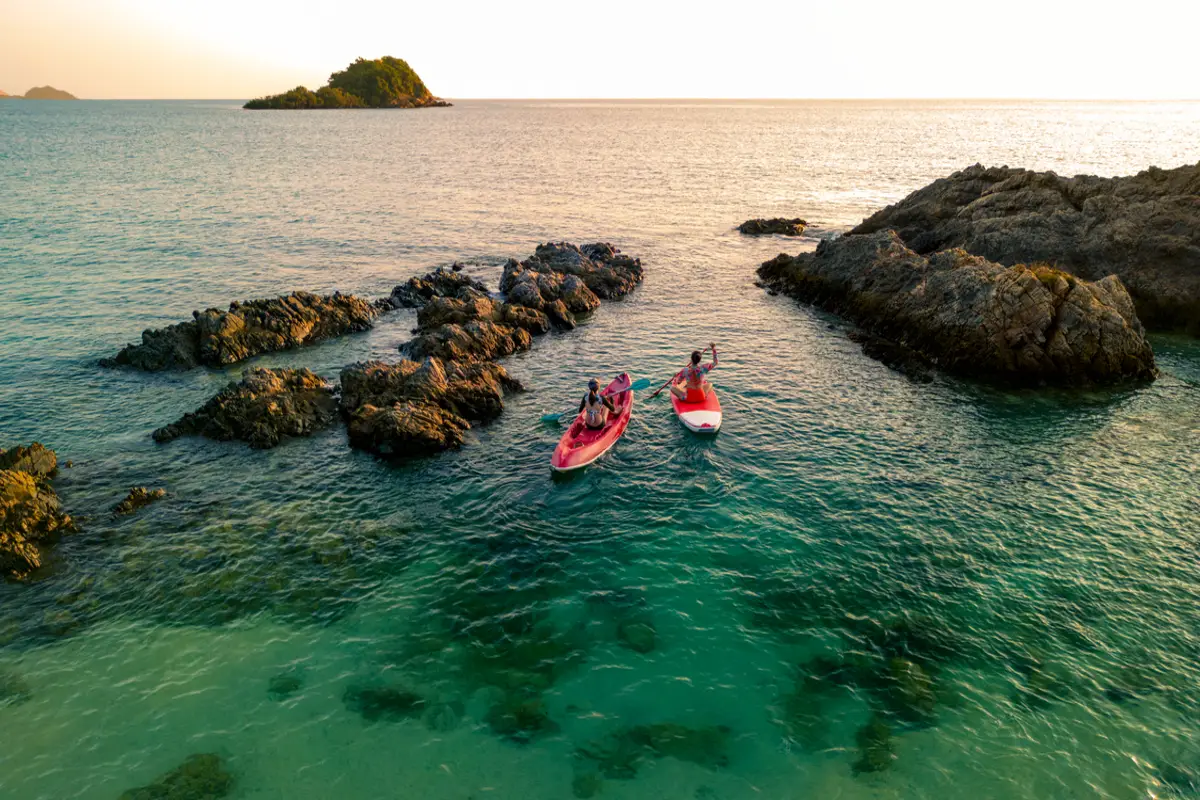
- Industry News
From arranging flights and accommodations to recommending destinations and activities, travel consultants offer valuable expertise and personalized service to meet…

Whether you aspire to become a corporate leader, entrepreneur or industry innovator, obtaining a business degree provides a solid foundation…

A brand is more than just a logo or a product; it’s the essence of what a company stands for…

The global event management industry is a vibrant and evolving sector that attracts a lot of people. This growth is…
Welcome to Les Roches
Privacy overview.

Travel Guide to Moscow, Russia
Travel guide to moscow, russia > features.
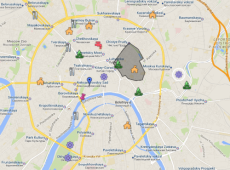
Map of Moscow center
This map of Moscow has all the best places marked on it. Just click on an icon to learn more about each place...

How to Find Apartments for Rent in Moscow, Russia
Finding a private apartment for rent in Moscow is a great way to experience the city life.

Contemporary Art in Moscow
Moscow had an amazing contemporary art scene in the 90s, but it's only recently that it started to become interesting again.

Arrival and Departure: Moscow Airports, Train Stations, Buses
The first impression is usually the strongest one, so here's all the information you'll need to make your arrival to Moscow go as smooth as possible.

Guide to Clubs, Bars and Nightlife in Moscow
If there is one thing that Moscow knows it's how to club well.

The Best Restaurants and Cafes in Moscow
You might be surprised, but Moscow has some of the best restaurants in the world.

Hotels in Moscow, Russia
Moscow is a super complicated place when it comes to finding good quality affordable accommodation.
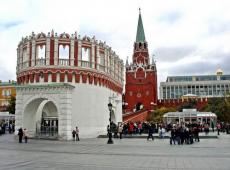
What is Moscow: Introduction, General Facts, and Brief History in Dates.
Moscow is a huge sprawling city that has a little bit of everything that Russia has to offer.
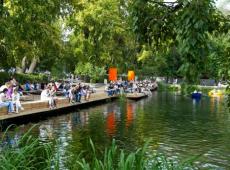
Moscow City Walks and Areas
The best way to explore Moscow is to go for a walk in one of the central neighborhoods or parks.
Travel Guide to Moscow, Russia > Most Popular
The Best Budget Hotels in Moscow, Russia
There are no really budget hotels in Moscow: some cost less than €100 per night, but are located far from the center.

Best 5 Star and 4 Star Hotels in Moscow, Russia
Desperately trying to be the capital of chic, Moscow has perhaps the highest ratio of 5-star hotels per square meter.

Internet and Cable TV in Moscow
Moscow nowadays is one of the most connected capitals in the world.

Brief History of Moscow
1147 - The first mention in the Historical Chronicles is made about the city of Moscow, which was founded by Russian prince Yury Dolgoruky.
Most Recent Articles:

- Our Service
- Our Photo Album
Moscow tours, business travel to Moscow, tour guide service, interpreting service
We are here to navigate you through Moscow and beyond. We specialize in private and customer-tailored tours for individuals and groups.
Tour options include:
- Moscow tours in 1 day/2days/3days (Red Square tour, Kremlin tour, metro tour, panoramic city tour, etc);
- Moscow panoramic city tour / night Moscow by legendary retro cars ;
- Layover tours in Moscow;
- Moscow cultural heritage tours, Moscow themed tours;
- Russian home hosted visits (visit to the Russian dacha);
- Russian culinary classes;
- Moscow-St.Peterburg tour package. Two Russian capitals in one week;
- Moscow-St.Petersburg educational tours for students and children;
- Russian towns of the Golden Ring (Sergiev Posad, Suzdal, Vladimir); Trips out of Moscow
- Shore excursions (Moscow/St.Petersburg)
- Russian honeymoon tours, photo walks in Moscow;
- Moscow tours for children
- Christmas time in Moscow;
- AK-47 shooting tour, tank T-34 ride, segway tour, fishing in Moscow region.
- Group Tours ( offers for travel agencies)
We are officially endorsed by Moscow Government to guide in most iconic tourist attractions of Russia’s capital such as Red Square, St. Basil’s Cathedral, museums of the Moscow Kremlin, the Tretyakov Art Gallery, etc.
We love our city and are ready to share with you our in-depth knowledge of Moscow, this old but very dynamic and amazing city. We will be glad to provide context and fun in equal measure opening up your eyes to Russian history, culture and art.
We know how to make the most of your time while you are here and will be delighted to turn your stay in Moscow into a life experience.
Why book with us?
- We love what we do.
- We highly value responsibility and individual approach.
- Our friendly booking service will help plan your itinerary according to your wishes. We are very flexible and design the tours individually for every customer.
- We are officially recognized by Moscow Government.
- Our training, qualifications, experience and personality will ensure that your visit to Moscow is a great success.
We take part in BBC series of documentaries "World's Busiest Cities"(Moscow)

Buy Tickets to the Bolshoi Theatre

Other special offers...
Interpreting and assistance at exhibitions and conferences, our garage ( vehicles+drivers), where to stay in moscow, what and where to eat in moscow, visa support, learning and discovery, our partners (trips to st.petersburg).
Copyright 2015 - Moscow Navigator
Brazil Delays Visa Requirement for American Tourists Until 2025

Dawit Habtemariam , Skift
April 10th, 2024 at 9:20 AM EDT
Brazil keeps pushing back its visa requirement for tourists from Australia, U.S. and Canada. Given the value of these markets to Brazil, maybe it should scrap the requirement altogether.
Dawit Habtemariam
Brazil postponed reinstating its visa requirements for tourists from Australia, Canada, and the U.S. until 2025, with President Luiz Inácio Lula da Silva signing a decree that included that action on Tuesday.
“The decree… postpones the start of [visa] collection to April 10, 2025,” said the tourism board, Embratur .
In 2019, Brazil changed its rules, allowing citizens from the U.S., Canada, and Australia to travel to Brazil without visas — after years of requiring them.
The Brazilian government planned to reinstate the visa requirement last October. But it postponed the change until January and then until this month. It has now postponed the change until April 2025.
Brazil Embraces Tourism
Embratur has been implementing an international dissemination strategy to inform the press, airlines, operator associations, and tourism agencies of the postponement.
The U.S. is Brazil’s second-largest international tourist market. Nearly 670,000 Americans visited Brazil in 2023, according to Embratur. In the first two months of 2024, North American arrivals in Brazil were 11% higher than in the same period of the previous year.
New Visa Rules in 2025
Starting April 10, 2025, Americans, Canadians, and Australians will have to apply for the visa. Its cost stands at $80.90. The visa’s validity length is as follows:
- Americans: 10-year period.
- Canadians: 5-year period.
- Australians: 5-year period.
Tour operators have warned that the new rules would make Brazil less competitive.
The Daily Newsletter
Our daily coverage of the global travel industry. Written by editors and analysts from across Skift’s brands.
Have a confidential tip for Skift? Get in touch
Tags: brazil , latin america , tourism , visa

Inside the World’s Rarest Experiences: Why the Rich Love Extreme Tourism
O n June 18, 2023, the submersible Titan lost contact with the outside world as it approached the wreckage of the Titanic 13,000 feet below sea level at the bottom of the North Atlantic.
Among the five people on board were ultra-rich extreme tourists who paid $250,000 each to cram into the makeshift sub and descend into the abyss.
Four days later, on June 22, an international search was called off when officials determined that Titan had imploded, killing all aboard.
Check Out: Dave Ramsey’s 10 Best Tips for Building Wealth: ‘Start Thinking Like Rich People’
Read More: 6 Genius Things All Wealthy People Do With Their Money
The next day, on June 23, Business Insider reported that it was unlikely that the tragedy would deter the world’s wealthy elite from paying top dollar to risk their lives for the sake of so-called “extreme tourism” — high-end, hardcore adventure travel that requires money most people will never have for experiences that most people would never want.
Sponsored: Protect Your Wealth With A Gold IRA. Take advantage of the timeless appeal of gold in a Gold IRA recommended by Sean Hannity.
Living It Up After COVID: You Have To Die of Something
The lifting of pandemic-era restrictions triggered an avalanche of cash into the extreme tourism realm as the rich lined up to part with small fortunes to experience the last remaining (mostly) unseen, untouched corners of the world and beyond.
Grand View Research reports that the extreme tourism industry was worth $322 billion in 2022 but is on pace to top $1 trillion in 2030.
Much of the enthusiasm comes from COVID itself.
Like everyone else, the rich watched helplessly as friends and loved ones died from humdrum daily tasks like trips to the grocery store or visits to the doctor’s office. Gone forever, their fortunes unspent, many rich survivors vowed to live their lives to the fullest, even if it killed them.
“More and more wealthy travelers are diving into extreme tourism because they understand how fleeting life can be,” said Frank Spitzer, CEO at Pelecanus , a luxury travel operator that specializes in upscale vacation packages in Colombia. “This mindset of embracing life’s unpredictability is pushing them to seek out thrilling adventures and extravagant getaways before change is ahead. Also, they can easily afford these extravagant expeditions, so why not?”
So, what, exactly, are these ‘extravagant expeditions’ and how much do they cost?
Saving Money: 6 Frugal Habits of the Super Rich and Famous
If You Have All the Money in the World, Why Not Leave It?
The Titanic wreckage sits roughly 2.5 miles below the surface of the ocean. That’s just a short stroll compared to the journey that space tourists take when they travel up and away from Earth’s oceans to a different kind of abyss.
Axiom Space is a privately funded space infrastructure corporation that flies missions to the International Space Station and its own Axiom Station. It offers so-called “private astronauts” the chance to visit space and view their home planet from the emptiness of the final frontier.
The company states, “Missions with Axiom include 17 weeks of expert training at space agency facilities that only a privileged few get to see. Training prepares the participant as an astronaut, develops a deep camaraderie with fellow astronauts and truly inaugurates one as a member of the exclusive space traveler family.”
Understandably, none of that comes cheap. Axiom Space doesn’t disclose the per-person cost of its private astronaut program, but Space.com estimates each seat sells for roughly $55 million.
Jet-Setting, Redefined
Some people would rather see the world than float above it — and they might not have eight figures to plunk down even if they did. For them, extreme tourism involves cramming as many experiences in as short a time with as much luxury as humanly possible.
Companies like Abercrombie & Kent organize mind-boggling global private jet tours like Around the World with Geoffrey Kent. It costs $185,000 per person — but think of what you get for the money.
The excursion takes place over 26 days, and in less than a month, the rich will receive insider access to local spots that regular tourists can’t visit in Japan, India, Malta, Senegal, Saint Helena, Uruguay, Easter Island and French Polynesia.
Their tour bus is a chartered Boeing 747 with full lie-down first-class seating, a dedicated staff and a chef. Wherever the passengers go, a valet, concierge, guide and luggage handler follow.
They probably won’t risk their lives, but they will experience the most extreme and expensive globe-trotting that money can buy.
Pursuing Extreme Animals and Environments
Another mainstay of extreme tourism is, naturally, the pursuit of the extreme — extreme wildlife, extreme environments, extreme weather, etc.
For example, Abercrombie & Kent — just one of several ultra-luxe extreme travel providers — offers the following packages that allow the rich to pursue the planet’s wildest side in style:
- North Pole Expedition Cruise: From $47,995 per person
- Arctic Cruise Adventure — In Search of Polar Bears: From $20,495 per person
- Kenya and Tanzania Wildlife Safari: From $11,995 per person
- Climb Kilimanjaro — Summiting the Machame Route: From $8,495 per person
- The Great Migration Safari in Style: From $19,795
- Galapagos Wildlife Adventure: From $11,495 per person
- Patagonia, the Last Wilderness: From $11,495 per person
More From GOBankingRates
- The Single Best Thing To Buy at Aldi in March 2024
- 10 Cars That Outlast the Average Vehicle
- This is One of the Best Ways to Boost Your Retirement Savings in 2024
- 6 Things You Should Never Do With Your Tax Refund (Do This Instead)
This article originally appeared on GOBankingRates.com : Inside the World’s Rarest Experiences: Why the Rich Love Extreme Tourism

Watch CBS News
What happens during a solar eclipse? Experts explain the awe-inspiring phenomena to expect on April 8
By David Pogue
Updated on: April 8, 2024 / 9:03 AM EDT / CBS News
Monday's total eclipse of the sun won't be just any old eclipse; it's being referred to as the Great American Eclipse, because it's going through some very populated areas of the United States. Solar eclipses actually occur every 18 months or so, but during most of them the spectacle is "wasted" on empty ocean. But this afternoon , the moon's shadow will leave 32 million Americans in 15 states briefly in the dark.
- Solar eclipse maps show 2024 totality path, peak times
Where is the best place to view the eclipse?
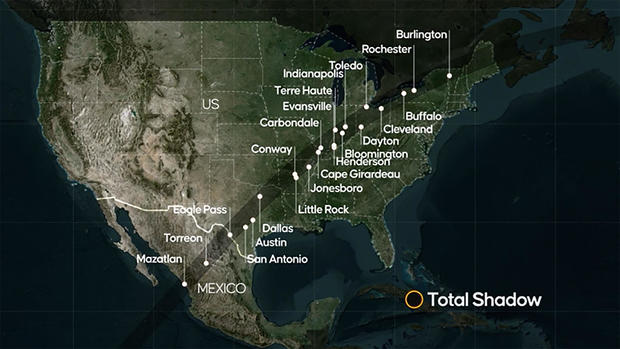
What exactly is a total eclipse?
Astronomy author and educator Ed Ting says that in a solar eclipse, the moon passes exactly between your eyes and the sun, and casts its shadow on the Earth. That shadow is only about 100 miles wide, so you have to be in a specific place to witness the solar eclipse in totality.
It's all the result of a freakish cosmic coincidence, when the moon and sun appear to be the exact same size in the sky. "The sun is 400 times bigger than the moon," said Ting. "But by happy coincidence, it is also 400 times further away. So, from our perspective they are the same size."

What can happen during a total solar eclipse?
But the thrill of an eclipse isn't just about what's overhead – it's what happens all around you as the sky darkens. "The wind sometimes starts to pick up," said Ting. "Animals get confused. The streetlights come on."
But it's not exactly like nighttime. "The sky takes on this sort of fish-scaly, shimmery quality, and you will freak out," Ting said. "You can understand why the ancients ascribe such spiritual or religious significance to eclipses, because you will feel very strange. Half of the people who see an eclipse for the first time will cry."
What preparations are being made?
If you live in the path of the eclipse, you may notice one more effect: A lot more traffic.
Cari White is the chairman of the Eclipse Oversight Committee for Jonesboro, Arkansas, where the moment of totality – complete blockage of the sun – will last 2 minutes and 17 seconds. And for that experience of totally, White said the town will briefly grow to twice its size: "One-hundred-sixty-thousand people might be in town for the eclipse, and we're very excited about it," she said. "Our police department, our fire department, city water and light, they've all been working for over a year to design a plan."
And Jonesboro is not alone: "Everywhere, all over the country, [people] are doing exactly what I've been doing. It's a big, big deal."
- How Americans in the solar eclipse's path of totality plan to celebrate the celestial event on April 8
- Here's how one airline is planning to provide a total eclipse experience — from 30,000 feet in the air ("CBS Mornings")
- Hotel prices soar as tourists flock to see solar eclipse
How to safely view the eclipse
Looking directly at the sun can permanently damage your vision, which is why you need eye protection. Cari White's committee in Jonesboro ordered 75,000 pairs of special glasses. "We have been working for weeks to pass them out to all the schools, we've passed them out at all of the major businesses, the library, the city hall," she said. "If you don't have a pair of glasses and you live in Jonesboro, I don't know how to help ya'."
But here's something about the glasses you might not know: According to Ting, "Once totality hits, you can take the glasses off. Because there's not much light coming from the sun. Once the sun starts to come out again, you do need to remember to put your glasses back on!"
Cameras need protective filters, too. But Ting offers a classic piece of advice for would-be photographers: "See your first eclipse, photograph your second. I have seen this personally where there is an eclipse, and the person is not looking up; they're fiddling with their camera. And then, before you know it, the eclipse is gone, you never saw it – and you didn't get the picture."
- Are your eclipse glasses safe? How to know if they'll really protect your eyes during the total solar eclipse
What about the weather?
Of course, all the precautions in the world won't help you if the conditions aren't right. Asked what she'll do if the weather is bad on Monday, White said, "I guess I'll cry. Don't talk to me about the bad stuff."
Fortunately, it's mostly good stuff.
"When you consider that this truly is the Great American Eclipse, because it goes through the center of the United States, it just puts you in awe," White said. "I just know that it's gonna be wonderful. And I'm gonna take it all in, every second of my two minutes, I'm gonna take it in and enjoy."
- Looking for the best places to see the April 8 solar eclipse in the totality path? You may have to dodge clouds
- Eclipse cloud cover forecasts and maps show where skies will clear up for April 8's celestial show
For more info:
- Visit Jonesboro Tourism & Visitor's Bureau website
- Follow amateur astronomer Ed Ting on YouTube
Story produced by Annie Iezzi. Editor: George Pozderec.

David Pogue is a six-time Emmy winner for his stories on "CBS Sunday Morning," where he's been a correspondent since 2002. He's also a New York Times bestselling author, a five-time TED speaker, and host of 20 NOVA science specials on PBS. For 13 years, he wrote a New York Times tech column every week — and for 10 years, a Scientific American column every month.
More from CBS News

"Sunday Morning" archives: Impressionism at 150

How to find the best tax relief company

Here's how to get a tax extension from the IRS in 2024

Woman found slain 38 years ago in California is identified
- You Are At:
Maldivian tourism body to hold roadshow in multiple Indian cities amid strained ties
Maldivian tourism body said they will hold roadshows in india to woo tourists back amid strain in india-maldives diplomatic ties..

The Maldives Association of Travel Agents and Tour Operators (MATATO), who met Indian High Commissioner Munu Mahawar in Male, said they intend to forge close collaboration with the Indian High Commission in the Maldives and also facilitate influencer and media familiarisation trips to once again bring back the tourism sector, which recently saw a significant dip.
"In this trajectory, plans are currently underway to launch comprehensive road shows across key Indian cities and to facilitate influencer and media familiarisation trips to the Maldives in the upcoming months," a local media news outlet quoted a Maldivian tourism body as saying.
Further, while calling India a crucial tourist market for the Maldives, MATATO added that they look forward to partnering with prominent travel associations and industry stakeholders across India to further promote the Maldives as a premier travel destination.
It is pertinent to note that the Maldivian tourism ministry has indicated a significant drop in the number of Indian tourists visiting the country. Pertinently, this comes after a full-blown backlash the Maldives received after three of its officials extended derogatory remarks against PM Narendra Modi during his visit to the Lakshadweep Islands, situated on India's west coast, on January 6.
The statement also triggered a wave of outrage, with prominent personalities across various fields in India calling for people to visit Lakshadweep instead of the Maldives.
Significantly, according to the statistics by the Maldives' Ministry of Tourism, there has been a significant drop in the number of Indian tourists visiting the country. This year, as of April 10, 37,417 Indian tourists visited the island nation. China (71,995) continued to lead the table, followed by the United Kingdom (66,999), Russia (66,803), Italy (61,379), and Germany (52,256). READ MORE | PM Modi wishes Maldives President Mohamed Muizzu on Eid-ul-Fitr amid frosty relations
READ MORE | Maldives's ex-minister disdains Indian flag in latest 'India-out' campaign, apologises after outrage
Read all the Breaking News Live on indiatvnews.com and Get Latest English News & Updates from World
- maldives govt
- india-maldives relations
- ministry of external affairs
- lakshadweep

Haryana: Gurugram schools may face disaffiliation if buses found unsafe for students

'What an impressive...', Priyanka Chopra gives shout-out to Dev Patel's Monkey Man on Instagram

LSG vs DC IPL 2024: Jake Fraser-McGurk, Kuldeep Yadav power Delhi Capitals to big win over Lucknow
Related World News

Iran likely to attack Israel in 48 hours as tensions escalate, claims report

Russia's foreign minister calls Taiwan 'integral part of China', Taipei slams 'false claims'

India issues travel advisory, advises citizens to avoid travel to Iran, Israel till further notice

China reacts to PM Modi's remarks, says 'great positive progress' made to resolve border dispute

US NSA Jake Sullivan to visit India next week; Indo-Pacific, tech cooperation on agenda
Latest News

Myanmar: India relocates staff from Sitwee as security situation remains precarious, issues advisory

Sandeshkhali: CBI gets 50 complaints of crimes against women, land grab on email ID on first day

Aaj Ki Baat: INDI alliance wants to make India powerless": PM Modi criticises CPI (M) manifesto calling for eliminating nuclear weapons
- Aap Ki Adalat
- Aaj Ki Baat
- Kurukshetra
- Haqiqat Kya Hai
- Entertainment

Lok Sabha Elections 2024: What’s holding back BJP in South India?

Jaati Ganit: Gandhi surname seat...new candidate yet repeat?

Haqiqat Kya Hai: Manifesto of anti-Modi...NO to atom bomb

Chunav 360: Today in Rajasthan, Modi told the dangerous plan of INDI Alliance..
- Maharashtra
- Uttar Pradesh
- Madhya Pradesh
- West Bengal
- Jammu & Kashmir
- Chhattisgarh

Aaj Ki Baat: Full episode, April 12, 2024

India TV poll: Should Rahul Gandhi follow Prashant Kishor's advice of stepping back from politics?

'They want to tease people, Mughal mindset': PM attacks Oppn over non-veg food, Tejashwi responds

Lok Sabha Elections 2024: Sanjay Singh meets Akhilesh Yadav in Lucknow, first after exit from Tihar
- Constituencies
- Key Candidates

Lok Sabha election: Kashmiri migrants in Jammu, Udhampur no longer required to fill ‘Form M’ to vote

Rajnath Singh attacks Congress in poll rally, gives dinosaur, ‘Big Boss’ references to party | WATCH

Lok Sabha Elections 2024: Full list of Congress, DMK, RJD, SP, AAP and other INDIA candidates

PBKS vs RR Dream11 Prediction: IPL 2024 Match 27 fantasy team, captaincy picks, predicted playing XI

WATCH | Kuldeep Yadav shatters stumps with googly to dismiss Nicholas Pooran on golden duck

LSG vs DC IPL 2024 Highlights: Jake Fraser-McGurk, Kuldeep Yadav shine in Delhi's win over Lucknow

Why is Mayank Yadav not playing in LSG vs DC IPL 2024 clash?

- Celebrities

Amar Singh Chamkila Movie Review: Thought provoking analogy by Imtiaz Ali, Diljit Dosanjh delivers his best, kudos to Parineeti Chopra

Emraan Hashmi, Mallika Sherawat's REUNION after 20-year feud steals spotlight: How it all began

Aayush Sharma REVEALS secret behind physical transformation for Ruslaan

South Korean girl group Aespa member Winter undergoes surgery for THIS reason, agency confirms
- Live Scores
- Other Sports

FIA and Formula 1 announce calendar for 2025; Australian Grand Prix returns as season opener

CERT-In finds vulnerabilities in Microsoft products: Here's how to protect yourself

Google rollouts Android 15's first public beta: Check new features, availability

Who are these 7 Indian gamers who recently interacted with PM Modi

Meta introduces new tools to protect teens against sextortion, intimate image abuse

Infinix launches Note 40 Pro 5G, Note 40 Pro+ 5G in India: Check price, specifications, availability

Middle East on edge over Iran's possible retaliation against Israel: How it would impact oil prices?

Darjeeling, Bardhaman-Durgapur and Asansol: The curious case of BJP's SS Ahluwalia

In 2024, at least 11 Indian students either killed or died mysteriously in US I Here's a full list

How did a 660-tonne steel pendulum protect Taiwan's largest skyscraper during 7.4 earthquake?

Why are Japan, Taiwan and other countries in that region prone to frequent earthquakes?

Horoscope Today, April 12: Gemini needs to make new plans for business; know about other zodiac sign

Horoscope Today, April 11: New changes arising for Scorpions; know about other zodiac signs

Horoscope Today, April 10: Health related problems to end for Pisceans; know about other zodiac sign

Horoscope Today, April 9: Luck to misunderstanding for Leo; know about other zodiac signs

Horoscope Today, April 8: Carelessness to cost big for Taurus; know about other zodiac signs

Eating seafood frequently can increase the risk of 'forever chemicals' exposure, says study

Summer health concerns: Tips to prevent unpleasant leg cramps during hot weather

Parkinson’s Awareness Month 2024: Know the symptoms and various stages of this disease

Hospital sinks are more prone to multidrug-resistant bacteria, says study

Superfood Lychee: Know THESE 5 benefits of this Tropical Fruit
- Relationships

When is Poila Baishakh 2024? Know exact date, significance and more about the Bengali New Year

Happy Baisakhi 2024: Wishes, messages, images, WhatsApp status to share with your friends and family

When is Vishu 2024? Date, rituals, significance, celebration and more about the Malayalam New Year

When is Puthandu 2024? Date, rituals, significance, celebration and more about the Tamil New Year

Summer Is Here: What parents should be aware of kids' hydration during this season?

IMAGES
VIDEO
COMMENTS
tourism, the act and process of spending time away from home in pursuit of recreation, relaxation, and pleasure, while making use of the commercial provision of services.As such, tourism is a product of modern social arrangements, beginning in western Europe in the 17th century, although it has antecedents in Classical antiquity.. Tourism is distinguished from exploration in that tourists ...
Nearly all sectors within the tourism industry were significantly impacted by the pandemic. Airlines had large losses of revenue due to reduced number of passenger with the International Air Transport Association estimating airline revenue loss to be around $314 billion in 2020. There was an 80% reduction of flights compared to the year 2019.
Tourism. Tourism is one of the world's fastest-growing industries and a major foreign exchange and employment generation for many countries. It is one of the most remarkable economic and social phenomena. The word 'tour' is derived from the Latin word tornus, meaning 'a tool for making a circle.'. Tourism may be defined as the ...
Tourism essentially refers to the activities undertaken by visitors, also known as the visitor economy. The tourism industry encompasses all activity that takes place within the visitor economy. This includes activities that are directly related to the tourist, such as staying in a hotel, ordering a meal or visiting a tourist attraction.
Tourism is a social, cultural and economic phenomenon which entails the movement of people to countries or places outside their usual environment for personal or business/professional purposes. These people are called visitors (which may be either tourists or excursionists; residents or non-residents) and tourism has to do with their activities ...
Tourism is the generic term used to cover both demand and supply that has been adopted in a variety of forms and used throughout the world. International tourism essentially refers to the activities undertaken by visitors, also known as the visitor economy. The tourism industry encompasses all activity that takes place within the visitor economy.
Tourism has massively increased in recent decades. Aviation has opened up travel from domestic to international. Before the COVID-19 pandemic, the number of international visits had more than doubled since 2000. Tourism can be important for both the travelers and the people in the countries they visit. For visitors, traveling can increase their ...
The contribution of tourism to economic well-being depends on the quality and the revenues of the tourism offer. UN Tourism assists destinations in their sustainable positioning in ever more complex national and international markets. As the UN agency dedicated to tourism, UN Tourism points out that particularly developing countries ...
Tourism is a social, cultural and economic phenomenon which entails the movement of people to countries or places outside their usual environment for personal or business/professional purposes. These people are called visitors (which may be either tourists or excursionists; residents or non-residents) and tourism has to do with their activities ...
International Tourism and COVID-19. Export revenues from international tourism dropped 62% in 2020 and 59% in 2021, versus 2019 (real terms) and then rebounded in 2022, remaining 34% below pre-pandemic levels. The total loss in export revenues from tourism amounts to USD 2.6 trillion for that three-year period. Go to Dashboard.
Tourism Industry: Everything You Need to Know About Tourism. What is the tourism industry? What is a tourist? What are the benefits of tourism? And what are all the sectors within the tourism Industry?
Globally, travel and tourism's direct contribution to gross domectic product (GDP) was approximately 7.7 trillion U.S. dollars in 2022. This was a, not insignificant, 7.6 percent share of the ...
For travelers, sustainability is the word—but there are many definitions of it. Most people want to support sustainable tourism, even though the concept remains fuzzy. The word "overtourism ...
Learn all about tourism, its advantages, host countries, cities, or any destinations, as well as all 5 sectors within this industry.
In 2016, tourism transport-related emissions contributed to 5% of all man-made emissions, while transport-related emissions from long-haul international travel were expected to grow 45% by 2030.
Tourism is one of the world's fastest growing industries and an important source of foreign exchange and employment, while being closely linked to the social, economic, and environmental well-being of many countries, especially developing countries. Maritime or ocean-related tourism, as well as coastal tourism, are for example vital sectors of the economy in small island developing States ...
1: Off-kilter genius at Delicatessen: Brain pâté with kefir butter and young radishes served mezze-style, and the caviar and tartare pizza. Head for Food City. You might think that calling Food City (Фуд Сити), an agriculture depot on the outskirts of Moscow, a "city" would be some kind of hyperbole. It is not.
Travel and Tourism Industry; A Complete Overview of All Activities. Learn more about the travel and tourism industries, their differences, and the sectors within those industries.
This approach ensures future generations can continue to enjoy destinations and cultures by fostering positive interactions between tourists and locals and conserving customs. Sustainable tourism also generates economic gains for all stakeholders, making a tangible impact on local economies. It's a pragmatic approach to achieve a harmonious ...
Tourism Statistics. Get the latest and most up-to-date tourism statistics for all the countries and regions around the world. Data on inbound, domestic and outbound tourism is available, as well as on tourism industries, employment and complementary indicators. All statistical tables available are displayed and can be accessed individually ...
Moscow is huge, exciting and exhausting at the same time. If you just visit The Red Square and Kremlin you won't get the whole picture. To enjoy the city you need to meet people and this travel guide will tell you how and where to do it.You can also find the best selection of hotels in Moscow, get our e-book city guide, learn about the best areas of Moscow to go for a walk, check out the best ...
In addition to our standard services, Grand Russia offers tours packages to Moscow and St Petersburg. You cannot resist our Two Hearts of Russia (7 Days &6 Nights), Golden Moscow (4 Days &3 Nights), Sochi (3 Days & 2 Nights), Golden Ring (1 Day & 2 Days), and many more. As a leading travel agency specializing in the tour to Russia and Former ...
We specialize in private and customer-tailored tours for individuals and groups. Moscow Tours. Business trips to Moscow. Eco-tours, hikings in Moscow region. Trips to the towns of the Golden Ring of Russia. MoscowNavigator International Travel Club. St. Petersburg tours. Tour options include: Moscow tours in 1 day/2days/3days (Red Square tour ...
"The decree… postpones the start of [visa] collection to April 10, 2025," said the tourism board, Embratur. In 2019, Brazil changed its rules, allowing citizens from the U.S., Canada, and ...
Grand View Research reports that the extreme tourism industry was worth $322 billion in 2022 but is on pace to top $1 trillion in 2030. Much of the enthusiasm comes from COVID itself.
Overall spending by visitors grew 14.7% from 2022 to an all-time high of $51.5 billion, with the average visitor spending $1,261. By comparison, visitors spent $867 on average in 2019.
Travel and tourism's global economic contribution is set to reach an all-time high of $11.1 trillion in 2024, according to the World Travel & Tourism Council's 2024 Economic Impact Research ...
Learn what happens during an eclipse, and about preparations in one Arkansas town that is expected to double in size due to eclipse tourism traffic. Monday's total eclipse of the sun will be ...
Tourism of all types can result in pollution and littering. And there can be environmental hazards associated with adventure-tourism activities such as kayaking, scuba diving, and rappelling. The Next Debate! Should summer reading be mandatory? Email your opinion to [email protected] by May 31. Your response might be featured online or in an ...
Maldivian Tourism body said they will hold roadshows in India to woo tourists back amid strain in India-Maldives diplomatic ties. Friday, April 12, 2024. English;